The title of chief did not appear in department records until 1879. From 1870-1879, the department was led by marshals.
| Marshal Richardson |
1870-1871 |
| Marshal A.E. Hastings |
1871-1872 |
| Marshal John McManigal |
1872-1873 |
| Marshal Brad Ringer |
1873-1874 |
| Marshal Phillip Cooper |
1874-1877 |
| Marshal Thomas Carr |
1877-1879 |
Chief from 1887 - 1888; 1893 - 1895; 1905 - 1909
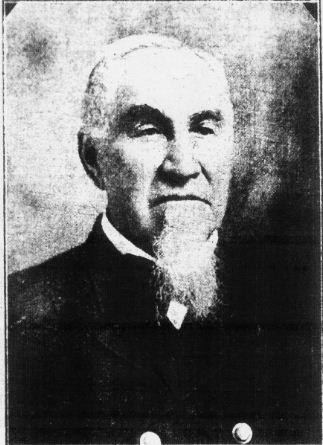 Phillip H. Cooper was born April 11, 1831 in New York where he lived until the age of twenty-two. He married Sarah (Hill) Cooper in 1855. They had five children in all. In order their children were Willard Cooper, Ida (Cooper) Hyde, Sam Cooper, John Cooper, and Sadie Cooper.
Phillip H. Cooper was born April 11, 1831 in New York where he lived until the age of twenty-two. He married Sarah (Hill) Cooper in 1855. They had five children in all. In order their children were Willard Cooper, Ida (Cooper) Hyde, Sam Cooper, John Cooper, and Sadie Cooper.
P.H. Cooper was appointed Lincoln's first chief of police upon the city of Lincoln being proclaimed a "City of First Class" on March 25, 1887. The responsibilities of the chief of police were not new to Cooper as he held the position of city marshal from 1874-1877. In fact, Cooper held the position of chief of police for a total of thirteen years spanning three terms from 1877 to his retirement in May of 1909.
Cooper arrived in Lincoln in November of 1869 and was known as the "ice king," being the owner of the only ice plant in Lincoln. He was also heavily involved in Democratic politics in an area that was predominantly Republican. He was seldom absent from Democratic gatherings and few conventions were held that did not have him as a delegate.
Cooper's popularity as marshal and chief of police was earned by his kindness and good nature, although he was known to be outspoken and pointed when necessary. Some of Cooper's responsibilities as chief of police included the control of drunkenness, segregation and gambling houses. John Sheedy, the victim of one of Lincoln's most infamous murders in 1891, was a fellow Democrat and friend of Cooper that owned a gambling house in the city. Despite the friendship, Cooper readily raided Sheedy's establishment whenever the mayor requested. Cooper understood and performed his duties as chief of police despite the circumstance.
Cooper's obituary in the June 7, 1918 Evening State Journal and Lincoln Daily News speaks of his popularity by stating that "[f]or a period of about forty years the name of P.H. Cooper appears in the columns of the Journal about as often, on an average, as that of any other citizen." Between his ice business, involvement in politics and time served as marshal and chief of police, few people were more favorably known in Lincoln than P.H. Cooper.
 Evening State Journal and Lincoln Daily News - Friday, June 7, 1918
Evening State Journal and Lincoln Daily News - Friday, June 7, 1918
Headline: P. H. Cooper Passes Away. Veteran Lincoln Police Chief Dies at His Home. Was Head of the Department for Thirteen years and a Pioneer Business Man.
P.H. Cooper. Pioneer citizen of Lincoln for many years prominent in political activities, died at 4:20 Friday morning, at the home of his son, John Cooper, 1412 B Street. Mr. Cooper had been filing in health for several years and took to his bed two months prior to his death. He was eighty-seven years old and is survived by one son, John, with whom he lived at the time of his death. A daughter, (Mrs. E. B. Hyde) died in 1900, and a son, Willard, died six or eight years ago.
Mr. Cooper came to Lincoln in November of 1869 by stage. Prior to that time he was a freighter over the plains and many stories are told of his experiences while working in that capacity. For many years he was known in Lincoln as the "Ice King" being the owner of the only ice plant here. He held the position of chief of police for a total of thirteen years, retiring from his last term in May 1909. In 1873 he was elected marshal under Mayor R.D. Silvers. In 1874 he was again chosen marshal under W. Littles. He served under R. D. Silvers in 1876 and for a short time under R. B. Graham. From 1887 to 1889 he served during the term of A. J. Sawyer and from 1893 to 1895 under Mayor A. H. Weir. His last two terms were under Mayor Brown. He was at one time a candidate for sheriff.
For a period of about forty years the name P. H. Cooper appears in the columns of the Journal about as often on an average as that of any other citizen. He was prominent as an ice dealer in the early days. His wagons covered the whole town and his name was indissolubly linked with that industry. He managed his affairs in the easy style that prevailed among business men at that time more than at present, and it is doubtful if he made a great deal of money. One reason for this was his kindness and his good nature. He never liked to press a creditor and would often talk with men in a friendly way and pass on without presenting a bill he had in his pocket, although he may have needed the money sorely.
A second cause for the appearance of his name in the paper frequently was his prominence in democratic politics. He was a member of the small group of old fashioned democrats who kept their organization and made regular campaigns in a city, county and state that had overwhelming republican majorities. Mr. Cooper was always present at democratic gatherings. Few conversations were held in forty years that did not have him as a delegate, usually from the Fourth ward. His homestead was at the northeast corner of Sixteenth and H streets where city buildings now stands. He lived there in a modest cottage amid a clump of overgreens until the ground was taken over for public purposes, about ten years ago.
A third element in Mr. Cooper's prominence was his repeated service as marshal and chief of police of the city of Lincoln. He was a careful and conscientious officer, but here again his kindness and good nature interfered somewhat with 100 per cent efficiency, according to modern standards. He introduced the human element into his work more than would be allowed at this time. Most of his service was performed when the city was small and everybody knew everybody else. His easy methods were popular in that stage of the development of the community. His work had to do mainly with the herding in of "drunks" the intervals with the management of real criminal. Whenever it was his duty to make an arrest he acted with plenty of vigor and courage when those qualities pointed in his statements. Those who knew him realized how easy it was to reach his heart.
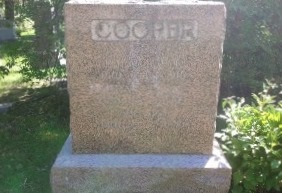 During a good part of Mr. Cooper's early career, open gambling houses were in operation in Lincoln. Many of the men of the little frontier city believed that they were "good for business" and used all their influence to see that the raids upon them were made with a velvet touch. John Sheedy was the king bee of the gamblers until he was killed by a negro a quarter of a century ago. He was a strong democratic politician and must have read the riot act in private to Marshal Cooper many a time and often, yet whenever the mayor of the city decided that it was necessary to make a raid, the police chief went at the business just as if he enjoyed it. Those were liberal easy-going days, without much desire on the part of leading citizens to see the law enforced strictly. It is considered very much to Mr. Cooper's credit that he went thru so many experiences in the police department thru so long a period retaining his friendship and his reputation for personal integrity to the last.
During a good part of Mr. Cooper's early career, open gambling houses were in operation in Lincoln. Many of the men of the little frontier city believed that they were "good for business" and used all their influence to see that the raids upon them were made with a velvet touch. John Sheedy was the king bee of the gamblers until he was killed by a negro a quarter of a century ago. He was a strong democratic politician and must have read the riot act in private to Marshal Cooper many a time and often, yet whenever the mayor of the city decided that it was necessary to make a raid, the police chief went at the business just as if he enjoyed it. Those were liberal easy-going days, without much desire on the part of leading citizens to see the law enforced strictly. It is considered very much to Mr. Cooper's credit that he went thru so many experiences in the police department thru so long a period retaining his friendship and his reputation for personal integrity to the last.
Funeral services will be conducted from St. Paul's M. E. church Sunday afternoon.
Phillip Cooper had been failing in health for several years and took to his bed two months prior to his death. He was 87 years old. He is buried in the Wyuka Cemetery along with his wife, Sarah, in Lincoln, Nebraska.
Chief from 1879 - 1881
Irving L. Lyman was born on January 16, 1846 in South Hadley, Massachusetts, where he was raised, educated and remained until the age of twenty-six. In 1871, he came to Lancaster County, Nebraska, and engaged in stock raising and farming for about two years. In 1873, he came to Lincoln and engaged in the newspaper business. He was connected with the Lincoln Daily Leader, and was manager and city editor of the Globe, after which he was elected City Marshal. In 1879, he was appointed Chief of Police in the Detective Department. He was married on April 28, 1874 to Miss Mary Dean of Lincoln. He was Secretary of the A. F. & A. M., Lodge No. 19, and was Worthy Master of the A. O. U. W., Lodge No. 35. In 1870, he was assistant superintendent of Dr. Jackson's Water Cure establishment in Dansville, New York.
Lyman lived to the age of 75 before his death on March 17, 1921. He is now buried in the Wyuka Cemetery in Lincoln, Nebraska along with his wife Mary D. Lyman (September 10, 1839 - July 29, 1928) and son Harry (April 1, 1875 - March 2, 1880).
Obituary - Nebraska State Journal - March 18, 1921
Had the death of I.L. Lyman occurred thirty years ago it would have been an event of large moment in the city of Lincoln. It is one of the tragedies of life that a man sometimes survives his contemporaries and is almost forgotten by the younger generation. Between twenty-five and forty-five years ago Mr. Lyman was a very prominent figure in this community. He was a printer and publisher, the head of the police department, the first man to undertake the management of the water works in a large way and an active man in many capacities around the city council for many years. For a time he published a newspaper at Minatare, Scottsbluff county. When he came back to town he lived so quietly that his name was hardly in the newspapers. In the early days no citizen was mentioned more often than I.L. Lyman.
Chief from 1882 - 1884
Luther J. Byer was born on October 31, 1836 in Greencastle, Cumberland County, Pennsylvania. In 1860, he moved to Indiana where he met his wife, Susan. Ten years later, they moved their family to Lincoln, Nebraska where he began work as a carpenter. In 1882, Byer was appointed to Chief of Police and served two terms. Upon leaving the police force, Byer was appointed to water commissioner by Mayor Frank Graham. He remained a prominent person in Lincoln until his death on December 18, 1911.
Lincoln Daily Star - December 18, 1911
Headline: Sudden Death of Luther J. Byer: Taken Suddenly with Heart Trouble, Dies within Few Minutes
But three minutes after he had complained of not feeling well, Luther J. Byer, 1510 P Street, an aged and prominent citizen of Lincoln, died of heart trouble Monday morning shortly after 10 o'clock, while he was sitting in the store of his son, W.J. Byer, 1537 O Street. Mr. Byer was sitting on a box near the front of the store. When it was noticed that he was ill, W.H. Leinberger, who was in the store at the time, offered assistance and called his son. By the time medical assistance had arrived Mr. Byer had died. Mr. Byer suffered a fainting spell late Sunday evening and was attacked again early Monday before going to the store.
Mr. Byer had been ailing for some time, but following his usual custom of making two or three trips to the store during the day, he walked in about 10 o'clock and sat down near the front of the establishment. He declared that he was not feeling well, and he was given a glass of water. A few minutes later- death came.
Mr. Byer was 75 years of age, and had been a resident of Lincoln for over thirty-two years. He was a carpenter by trade, and followed this occupation until a few years ago, when he retired. About twenty years ago he was appointed Chief of Police and held that position for two terms. Later under Mayor Frank Graham, he was appointed water commissioner, and he held this position for one term. Mr. and Mrs. Byer have lived at 1510 P Street for nearly fifteen years. They would have been married fifty-five years in May. He was a prominent member of St. Paul's church and was a regular attendant at the services, always occupying the same pew.
While it was known that he was not in the best of health, death came so suddenly that it was an extreme shock to the wife and son. He was jovial by nature, and Monday morning conversed freely and jokingly with one of the young men who roomed at his home. Shortly after his death and before Mrs. Byer had been notified, she telephoned to the store of her son and asked if he had arrived safely, as she thought that he did not appear to be well and was slightly worried. She was not told of his death then, and someone was sent to break the sad news to her before the body was brought home.
Luther J. Byer was born October 31, 1836 at Greencastle, Cumberland County, Pa. In 1860 he moved to Newcastle, Ind. He was married in May, 1867, and his wife, Susan, survives him. In 1870 Mr. and Mrs. Byer moved to Lincoln, where they have since resided. To this union was born six sons. But two, Sample and W.J. lived to reach manhood. Sample Byer died in 1879 and W.J. Byer is the only son living. He resides at 1515 L Street.
Mr. Byer leaves, besides his wife and son, a sister, Mrs. S. Babb of Marion, Ind., and two brothers, John Byer of Newcastle, Ind., and Sample C. Byer of Richmond, Ind. Funeral arrangements will be announced later.
Chief from 1884 - 1886
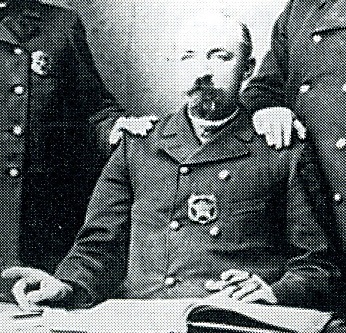 C. B. Beach was born April of 1844 in Ohio. He spent some time in Indiana, and then moved to Nebraska when he was about twenty-four years old. He was married to Emma (Floyd) Beach until her death in 1898 at about the age of 37. Chambers and Emma had at least two children, Lulu (Beach) Shahan, and Goldwin F. Beach. C. Beach served in the civil war as a Private with Co. K of the 70th Illinois Infantry. He became Lincoln's Police Chief in 1884 and served until 1886.
C. B. Beach was born April of 1844 in Ohio. He spent some time in Indiana, and then moved to Nebraska when he was about twenty-four years old. He was married to Emma (Floyd) Beach until her death in 1898 at about the age of 37. Chambers and Emma had at least two children, Lulu (Beach) Shahan, and Goldwin F. Beach. C. Beach served in the civil war as a Private with Co. K of the 70th Illinois Infantry. He became Lincoln's Police Chief in 1884 and served until 1886.
Obituary - Nebraska State Journal - July 9, 1910
The funeral of C.B. Beach, who died in Denver Thursday morning, will be held from the First Presbyterian Church Sunday afternoon at 3 o'clock. The body arrived in Lincoln yesterday afternoon.
Mr. Beach has been in Denver only about two years. Prior to that time he lived in Lincoln nearly forty years, having moved to this city from Indiana early in 1868. He was well known to Lincoln people as one of the oldest settlers. While here he engaged in various occupations. He served as constable for a time, was employed with one of the lumber companies and was for a time chief of police. He also served for a long time as patrolman on the Lincoln police force.
Mr. Beach was a veteran of the civil war, having served in one of the Indiana regiments. He was sixty-six years old. He leaves a wife, a son and a daughter. The daughter, Mrs. Coe Shahan, was with him in Denver, where he had gone for his health. The son lives in Kansas City. He also has a brother, Alfred B. Beach, who lives in Lincoln at 2031 L Street.
When the capital of Nebraska was moved from Omaha to Lincoln when Nebraska was admitted to the Union, Mr. Beach and his brother, Thomas, now deceased, hauled the state house records from Omaha to Lincoln in a wagon.
From "History of the City of Lincoln" 1889, A.B. Hayes & Sam Cox, pp. 110-113
The incidents attending the removal of the capitol are interesting. The people of Omaha seemed to be determined to prevent the taking away of the Government effects, and hence it was deemed better to send the State library and other capitol belongings away by night, so as to avoid any opposition. Accordingly Auditor Gillespie secured a contract from Mr. J.T. Beach, of Lincoln, for moving the goods. Mr. Beach had arrived in the town in the spring of 1868, and the removal was made in the early winter, probably about the middle of December. Mr. Beach is now nearly fifty years of age, the fourth of October, 1889, completing the first half century of his existence, and he remembers the occurrences of those days very distinctly. Mr. Beach was born in Brown County, Ohio, October 4, 1839, where he lived until he was ten years old. At that time his parents moved to Indiana, where he lived with them for a number of years. In 1861, he enlisted in the army, in the Tenth Indiana Infantry and served three years. So that when Mr. Beach came to Nebraska, in 1868, he had had recent training that well fitted him for the work which he undertook to do.
Securing the services of a Mr. Carr, yet a resident of Lincoln, to help him, Mr. Beach started with a two horse team and Mr. Carr with four horses, to move the capitol to Lincoln. They crossed the Platte at Ashland, the drifting ice making the crossing very difficult and dangerous. Along with these two men was Luke Cropsey, a son of A. J. Cropsey who rendered valuable assistance during the trip. The trip occupied nearly a day and a half, for on the second morning, (Saturday,) at 11 o'clock, the party, with two covered wagons, drove into Omaha, and put up at the old checkered barn, one of the early landmarks of the "city by the Big Muddy." In the afternoon Mr. Beach went to the State House, and had a conference with Mr. Gillespie, who strictly enjoined upon him secrecy as to his mission to Omaha, and made arrangements for loading the furniture. After night-fall of Sunday the library, furniture, desks, and everything else that was wanted at the new capitol, were loaded into the two covered wagons, ready for the return trip.
At 4 o'clock Monday morning the start for Lincoln was made, and miles of ground had been covered before the people of Omaha awoke. Mr. Beach and his assistants came by the way of Plattsmouth. When that hamlet was reached the snow was coming down fiercely and heavily, and a stop was made until morning, as it was considered too dangerous to cross the river in the condition in which the ferry then was. About ten o'clock in the morning the ferry was repaired, and the party crossed the river with much inconvenience and considerable danger. The journey was continued until night-fall, through a blinding snow storm. As night approached Stove creek was several miles distant, and the only shelter visible was the dugout of a settler on an open prairie. Going to the door of this cabin Mr. Beach asked for shelter the night for himself and two companions, and a place to shield their teams from the elements. The settler refused, on the ground of want of accommodations; but our travelers were not thus to be refused, and upon pressing their need were allowed to shelter their horses by a hay stack, and bunk themselves upon the floor of the cabin. The night passed, and the morning came Mr. Beach informed his host that the party was without money, told him what their errand was, and offered to pawn two watched as security for the payment of the amount due for the night's lodging; and breakfast. This the old settler refused, and the teamsters departed for Lincoln, which place they reached on Wednesday night, promising to send their pay for their lodging as soon as they Lincoln, which promise they kept. Five days the journey occupied, and when it was finished the whole of the State library and other needed capitol appliances were safely lodged within the walls of the building.
The cost of transferring this property was over $100. Mr. Beach took $60 in money with him and a check of $40 on a Lincoln bank. When the money was exhausted in Omaha, Mr. Beach tried to cash the check, but the Omaha banks proposed to charge him a ruinous discount, and had it not been for the kindly assistance of Mr. Gillepsie, who cashed the check free of charge, a row would have resulted. Mr. Carr avers that he has never been paid in full for the services of himself and his four-horse team while engaged in this enterprise, and as no one seems to dispute his claim. It is probable that someone, possibly the city of Lincoln, owes him more than simple debt of gratitude. But the whole affair was conducted in a most satisfactory manner, and the capitol was in reality lost to Omaha.
At that time the people of Omaha were not very well pleased with the course the events were taking, which the following incident will illustrate, and will also serve to show how carefully the work of removal was done. A few days after the library had disappeared across the prairie, John R. Meredith, of Omaha, dropped into Auditor Gillespie's office in the afternoon, and, noticing the empty shelves, inquired where the library had gone.
"It has gone to Lincoln," said Mr. Gillespie.
"Who sent it there, and by what authority was it sent?" was Mr. Meredith's next question.
"I sent it there," said Gillespie, "by authority vested in me by the State Legislature." Meredith left, and soon Gen. S. A. Strickland stormed into the Auditor's office, with about the same interrogatories, which were answered in the same manner.
"Where is the library?" said the General.
"In Lincoln, the State capital," calmly answered Gillespie.
"By the eternals that library is coming back here, and it's coming right away," stormed Strickland.
All this buster and blow did not disturb Gillespie, who quietly asked how the General purpose was to be accomplished. Gen. Strickland then said that the library belonged to the Territory of Nebraska, and as Omaha was the capital of the Territory, the library belonged to Omaha, and that he would get an order from the Secretary of the Interior for its replacement in Omaha. Mr. Gillespie smiled, and merely asked that when Gen. Strickland received his letter he might be allowed a chance to read it, which the General readily acceded to. Matters quieted down and remained so for some weeks, when one day Mr. Gillepsie asked Gen. Strickland if he had heard from Washington yet. The General unwillingly admitted that he had, and that the reply was unfavorable to Omaha's claims. This ended the skirmishing and kicking. The capital was removed, and since then no attempt of alarming proportions has been made to have capital location changed.
Chief from 1887 - 1888; 1893 - 1895; 1905 - 1909
 Phillip H. Cooper was born April 11, 1831 in New York where he lived until the age of twenty-two. He married Sarah (Hill) Cooper in 1855. They had five children in all. In order their children were Willard Cooper, Ida (Cooper) Hyde, Sam Cooper, John Cooper, and Sadie Cooper.
Phillip H. Cooper was born April 11, 1831 in New York where he lived until the age of twenty-two. He married Sarah (Hill) Cooper in 1855. They had five children in all. In order their children were Willard Cooper, Ida (Cooper) Hyde, Sam Cooper, John Cooper, and Sadie Cooper.
P.H. Cooper was appointed Lincoln's first chief of police upon the city of Lincoln being proclaimed a "City of First Class" on March 25, 1887. The responsibilities of the chief of police were not new to Cooper as he held the position of city marshal from 1874-1877. In fact, Cooper held the position of chief of police for a total of thirteen years spanning three terms from 1877 to his retirement in May of 1909.
Cooper arrived in Lincoln in November of 1869 and was known as the "ice king," being the owner of the only ice plant in Lincoln. He was also heavily involved in Democratic politics in an area that was predominantly Republican. He was seldom absent from Democratic gatherings and few conventions were held that did not have him as a delegate.
Cooper's popularity as marshal and chief of police was earned by his kindness and good nature, although he was known to be outspoken and pointed when necessary. Some of Cooper's responsibilities as chief of police included the control of drunkenness, segregation and gambling houses. John Sheedy, the victim of one of Lincoln's most infamous murders in 1891, was a fellow Democrat and friend of Cooper that owned a gambling house in the city. Despite the friendship, Cooper readily raided Sheedy's establishment whenever the mayor requested. Cooper understood and performed his duties as chief of police despite the circumstance.
Cooper's obituary in the June 7, 1918 Evening State Journal and Lincoln Daily News speaks of his popularity by stating that "[f]or a period of about forty years the name of P.H. Cooper appears in the columns of the Journal about as often, on an average, as that of any other citizen." Between his ice business, involvement in politics and time served as marshal and chief of police, few people were more favorably known in Lincoln than P.H. Cooper.
 Evening State Journal and Lincoln Daily News - Friday, June 7, 1918
Evening State Journal and Lincoln Daily News - Friday, June 7, 1918
Headline: P. H. Cooper Passes Away. Veteran Lincoln Police Chief Dies at His Home. Was Head of the Department for Thirteen years and a Pioneer Business Man.
P.H. Cooper. Pioneer citizen of Lincoln for many years prominent in political activities, died at 4:20 Friday morning, at the home of his son, John Cooper, 1412 B Street. Mr. Cooper had been filing in health for several years and took to his bed two months prior to his death. He was eighty-seven years old and is survived by one son, John, with whom he lived at the time of his death. A daughter, (Mrs. E. B. Hyde) died in 1900, and a son, Willard, died six or eight years ago.
Mr. Cooper came to Lincoln in November of 1869 by stage. Prior to that time he was a freighter over the plains and many stories are told of his experiences while working in that capacity. For many years he was known in Lincoln as the "Ice King" being the owner of the only ice plant here. He held the position of chief of police for a total of thirteen years, retiring from his last term in May 1909. In 1873 he was elected marshal under Mayor R.D. Silvers. In 1874 he was again chosen marshal under W. Littles. He served under R. D. Silvers in 1876 and for a short time under R. B. Graham. From 1887 to 1889 he served during the term of A. J. Sawyer and from 1893 to 1895 under Mayor A. H. Weir. His last two terms were under Mayor Brown. He was at one time a candidate for sheriff.
For a period of about forty years the name P. H. Cooper appears in the columns of the Journal about as often on an average as that of any other citizen. He was prominent as an ice dealer in the early days. His wagons covered the whole town and his name was indissolubly linked with that industry. He managed his affairs in the easy style that prevailed among business men at that time more than at present, and it is doubtful if he made a great deal of money. One reason for this was his kindness and his good nature. He never liked to press a creditor and would often talk with men in a friendly way and pass on without presenting a bill he had in his pocket, although he may have needed the money sorely.
A second cause for the appearance of his name in the paper frequently was his prominence in democratic politics. He was a member of the small group of old fashioned democrats who kept their organization and made regular campaigns in a city, county and state that had overwhelming republican majorities. Mr. Cooper was always present at democratic gatherings. Few conversations were held in forty years that did not have him as a delegate, usually from the Fourth ward. His homestead was at the northeast corner of Sixteenth and H streets where city buildings now stands. He lived there in a modest cottage amid a clump of overgreens until the ground was taken over for public purposes, about ten years ago.
A third element in Mr. Cooper's prominence was his repeated service as marshal and chief of police of the city of Lincoln. He was a careful and conscientious officer, but here again his kindness and good nature interfered somewhat with 100 per cent efficiency, according to modern standards. He introduced the human element into his work more than would be allowed at this time. Most of his service was performed when the city was small and everybody knew everybody else. His easy methods were popular in that stage of the development of the community. His work had to do mainly with the herding in of "drunks" the intervals with the management of real criminal. Whenever it was his duty to make an arrest he acted with plenty of vigor and courage when those qualities pointed in his statements. Those who knew him realized how easy it was to reach his heart.
 During a good part of Mr. Cooper's early career, open gambling houses were in operation in Lincoln. Many of the men of the little frontier city believed that they were "good for business" and used all their influence to see that the raids upon them were made with a velvet touch. John Sheedy was the king bee of the gamblers until he was killed by a negro a quarter of a century ago. He was a strong democratic politician and must have read the riot act in private to Marshal Cooper many a time and often, yet whenever the mayor of the city decided that it was necessary to make a raid, the police chief went at the business just as if he enjoyed it. Those were liberal easy-going days, without much desire on the part of leading citizens to see the law enforced strictly. It is considered very much to Mr. Cooper's credit that he went thru so many experiences in the police department thru so long a period retaining his friendship and his reputation for personal integrity to the last.
During a good part of Mr. Cooper's early career, open gambling houses were in operation in Lincoln. Many of the men of the little frontier city believed that they were "good for business" and used all their influence to see that the raids upon them were made with a velvet touch. John Sheedy was the king bee of the gamblers until he was killed by a negro a quarter of a century ago. He was a strong democratic politician and must have read the riot act in private to Marshal Cooper many a time and often, yet whenever the mayor of the city decided that it was necessary to make a raid, the police chief went at the business just as if he enjoyed it. Those were liberal easy-going days, without much desire on the part of leading citizens to see the law enforced strictly. It is considered very much to Mr. Cooper's credit that he went thru so many experiences in the police department thru so long a period retaining his friendship and his reputation for personal integrity to the last.
Funeral services will be conducted from St. Paul's M. E. church Sunday afternoon.
Phillip Cooper had been failing in health for several years and took to his bed two months prior to his death. He was 87 years old. He is buried in the Wyuka Cemetery along with his wife, Sarah, in Lincoln, Nebraska.
Chief from 1888 - 1889
W.W. Carder was born in Harrison County, West Virginia. August 2, 1838. He later moved to Nebraska in 1857 where he worked as a freighter, and in the newspaper business. After moving to Lincoln around 1860 he married Nancy Schwartz on April 16, 1861 and they had four children; however, only two survived. Their children were Willie E. Carder (~1869) and Mary E. (Carder) Herrick (March 10, 1864 - January 1, 1945). He became chief in 1888 and even after he left the position of chief in 1889, he was still working for the department until at least 1893.
Obituary - Nebraska State Journal - August 1, 1902
W. W. Carder, one of the pioneers of Lincoln, died yesterday morning at the home of his daughter, Mrs. James H. Herrick in Ogden, Utah. The news of his demise was contained in a telegram from James B. Herrick to his brother, J.D. Herrick, of this city.
Mr. Carder had been spending the last years of his life at the home of his daughter in Ogden. He was born in Harrison County, West Virginia on August 2, 1838. In his youth he served an apprenticeship in a printing office at Lebanon, Ohio. He came to Nebraska in 1857 and for seven years engaged in freighting across the plains. In 1864, he went into the newspaper business, becoming foreman of the Nebraska City Press. Three years later he came to Lincoln and in company with C.H. Gere established the Commonwealth, afterward The State Journal. At that time, Lincoln was a city of tents largely. He next went into the railway mail service for four years after which he removed to a farm in Middle creek precinct. In 1885 he again became a resident of Lincoln and ran the Howard house at the corner of Thirteenth and O streets. Afterwards he ran the Carder European hotel at 934 P Street.
In politics, Mr. Carder was a republican and took considerable part in local campaigns. He represented Lancaster County in the legislature of 1879. Under Mayor Robert B. Graham he was chief of the Lincoln Police. He had charge of the exposition guards at the Omaha exposition in 1898 and it was just after its close that he went to Utah. Soon after moving to Utah he was stricken with paralysis, from which he never recovered. He grew better at times, but never was able to leave his bed.
Indefinite information has been received concerning the place of burial, but his relatives here believe the body will be brought to Lincoln for interment in the Wyuka Cemetery by the side of his children.
Carder was buried in Wyuka along with his wife, Nancy, and son, Willie.
Chief from 1890 - 1891 and 1895 - 1898
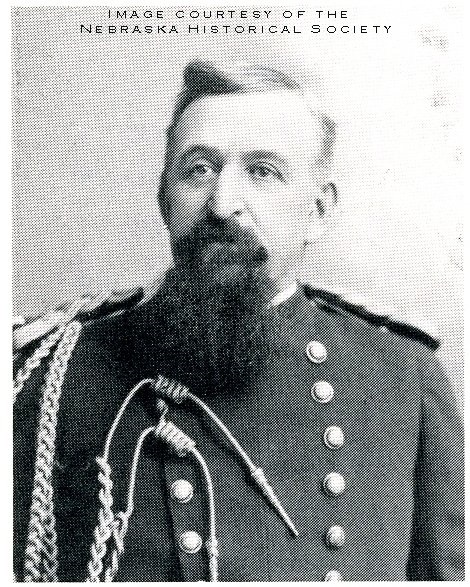 Born in Clinton, New Jersey on March 24, 1853, Melick's family migrated to Marshall County, Illinois around 1859. He worked on his father's farm and pursued his education at the common school and Marshall College of Illinois.
Born in Clinton, New Jersey on March 24, 1853, Melick's family migrated to Marshall County, Illinois around 1859. He worked on his father's farm and pursued his education at the common school and Marshall College of Illinois.
In the spring of 1870, Melick moved to Lancaster County, Nebraska and acquired a homestead claim on Section 22, Rock Creek precinct. He lived there for ten years until he was appointed deputy sheriff under Granville Ensign in 1880. In the fall of 1883, he was elected sheriff, a position he retained for six years. In 1890 he was appointed as the chief of police of Lincoln and after a year and a half was appointed Deputy United States Marshal under Marshal Brad D. Slaughter. When Frank Graham was elected mayor, Melick once again was appointed chief of police. As a major law-enforcement figure in the city, Melick took initiative against the Lincoln male subculture of saloons, gambling halls, and commercialized sex.
When John Sheedy was attacked in January of 1891, Melick arrived with Doctor C. S. Hart at the scene of the crime and questioned Mary Sheedy about the incident. The following day Melick and Detective James Malone interrogated residents and patrons in Lincoln's demimonde in search of witnesses; their investigation led to the arrest of Monday McFarland. Once in jail, McFarland confessed (allegedly by coercion) to participating in a plot with Mary Sheedy to kill John Sheedy.
Melick was active in the Republican Party in Lancaster County and owned shares of stock in the Nebraska Stock Yards. He belonged to Masonic Lodge No. 54, was "a standard bearer of Mount Moriah Commandery No. 4," a charter member of Elks Lodge No. 80 and also belonged to the Knights of Pythias Central City Lodge No. 68. According to one source, Melick was "one of the best known citizens of Lancaster County." He earned the title of colonel by serving on the staffs of Governors Dietrich, Savage, and John H. Mickey, and was popularly known as Colonel Melick, a "public-spirited and progressive citizen."
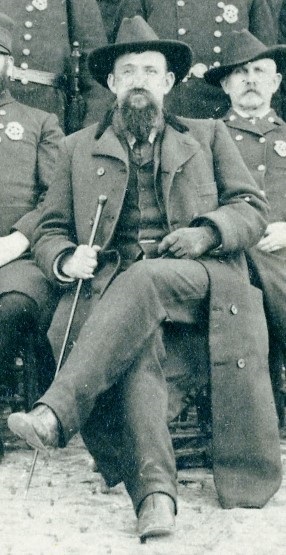 After retiring briefly, Melick took up detective work as a representative of the Nebraska Banking Association to assist in apprehending bank robbers. In 1912, he became warden of the penitentiary, a position he held for ten months before becoming a United States mail contractor. In his later years, Melick also dealt with real estate in Lincoln.
After retiring briefly, Melick took up detective work as a representative of the Nebraska Banking Association to assist in apprehending bank robbers. In 1912, he became warden of the penitentiary, a position he held for ten months before becoming a United States mail contractor. In his later years, Melick also dealt with real estate in Lincoln.
In 1866, Melick married Moly Ogan of Washington County, Iowa; they had three children before Moly died in June of 1880. He re-married in 1883 to Kittie Langdon of Janesville, Wisconsin. Melick's sole son, Harry Hastings, was born in Lincoln on June 18, 1888 and moved to New York City to pursue a career in the theatrical business. Melick lived at 903 K Street until around 1890 when he moved into a house at 2444 P Street. As police chief he operated out of a building at 309 N. Tenth Street.
Obituary - Lincoln Star - January 22, 1923
Headline: S.M. Melick Passes Away: Former Warden of Nebraska State Penitentiary and Long a Peace Officer in Lancaster County, Dies Monday Morning
Served as Police Chief and Sheriff
Placed in Charge of Prison Following Outbreak in 1812 When Four Officials Were Killed - Was Well Known Throughout the State
Samuel M. Melick, 70, former warden of the Nebraska state penitentiary, and for many years a peace officer in Lancaster county, died at 9:30 a.m., Monday at his home at Melick Court from heart and kidney disease after an illness of a year's duration.
Mr. Melick has been confined to his bed for the last six months and only twice during that period was he able to leave his home.
Mr. Melick had served for several years as chief of police of this city and six years as sheriff of Lancaster County. He spent several years as detective for the Nebraska Bankers' association and apprehended a number of notorious bank robbers. Mr. Melick had also served as deputy United States Marshall.
In the spring of 1890, he settled on a homestead claim in Lancaster County in Rock Creek precinct, where he lived until he was appointed deputy sheriff under Granville Ensign and filled that position from 1880 until the fall of 1883, when he was elected to the office of sheriff, which he held through reelection for six years. Mr. Melick retired from that office in 1890 and was appointed chief of police of Lincoln. He was appointed deputy United States marshal under Marshal Brad D. Slaughter and served the governor until Mayor Frank Graham was elected when he was again appointed chief of police. Mr. Melick later took up detective work as a representative of the Nebraska Banking association to aid in apprehending bank robbers.
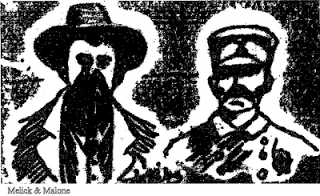 It was while he was engaged in detective work in 1912, that the outbreak in the state penitentiary occurred and Warden James Delahunty, two deputy wardens and one usher were killed by the prisoners. The militia was placed in charge and Mr. Melick was made warden of the state penitentiary. Under his control affairs were placed on safe and normal basts. He held that position for ten months.
It was while he was engaged in detective work in 1912, that the outbreak in the state penitentiary occurred and Warden James Delahunty, two deputy wardens and one usher were killed by the prisoners. The militia was placed in charge and Mr. Melick was made warden of the state penitentiary. Under his control affairs were placed on safe and normal basts. He held that position for ten months.
Mr. Melick had made investments from time to time in real estate in Lincoln and had large property holdings in the city at the time of his death.
Active In Community Affairs
He was prominent in Masonic circles in which he had attained high rank. He was a standard bearer of Mount Moriah, Commandery no. 4 for fourteen years. He was also a charter member of Elks lodge, No. 80. of Lincoln. He had the social qualities and the sterling traits of character which win friendship and regard. In many ways he had been connected with public life of the community and his attitude had always been that of a public-spirited progressive citizen. He served on the staffs of Governors Dietrich, Savage and John H. Mickey.
Samuel Miller Melick was born in Clinton, Hunterdon County, N.J., March 24, 1853, a son of Peter and Jarre Maria (Miller) Melick. He was a lad of eight years when his family removed to Illinois, where he acquired a common school education and later attended Marshall College of Illinois. His practical training was received in farm work under his father.
The marriage of Mr. Melick to Miss Kittie Langdon, of Lincoln, occurred December 29, 1883. Besides his wife he is survived by two daughters miss Minnie Melick and Mrs. Mae McCandless of California, who left Sunday for Lincoln on account of the serious illness of their father. His son, Harry H. Melick, was killed during the war.
The body is being held at the home pending the funeral.
Melick's body is buried in Wyuka Cemetery in Lincoln, Nebraska along with his wife Kittie, and son, Harry.
Chief from 1891 - 1892
Oliver Perry Dinges was born on May 12, 1844 in Centre County, Pennsylvania where he was raised and partially educated. In 1854, he moved to Illinois with his parents. During this time, he worked on the farm during the summer and attended school in the winter. He also worked on the railroad and in the lumber business for a few years in Wisconsin. Dinges moved to Lincoln in 1874 where he married Alice Elizabeth (Preston) Dinges (1843-1922) of York State and together they had two children, Pansey B. Dinges (1883-1974) and Oliver Perry Dinges Jr. (1887-1913).
On Sep. 10, 1891 Chief Dinges conducted a raid on some gambling rooms over a place called the Ivy Leaf saloon. After the raid Dinges was accused of stealing $35 (about $840 in present day monetary value) from one of the cash drawers and this eventually led to a few lawsuits. The following article courtesy of the Lincoln Evening News talks about a brawl that occurred in result of the raid.
Lincoln Evening News - Thursday, Sept. 24, 1891
Headline: A Clash of Arms
Police and Civil Officers in Battle Array, At Lincoln's City Hall.
Chief Dinges Resists the Attempt of the Gamblers to Get Their Apparatus Back by Means of a Constable - A Lively Time with a Ridiculous Finale. An Exotic Time.
One of the most intensely exciting incidents of which Lincoln has ever been the theatre, took place around the city hall last night, and it had a most ludicrous ending after all. The whole trouble arose over a writ of replevin sworn out in Justice Foxworthy's court for the gambling apparatus captured in Bradeen's place when it was raided two weeks ago. Fullington was formerly a paper-hanger in Bradeen's employ when the latter was in that business, and it is hinted that he is only a figurehead in the whole deal.
Shortly after 4 o'clock Constable Kaufman appeared at police headquarters and demanded the stuff. Chief Dinges told him he did not know where it was, Kaufman expressed his belief that he did, and affirmed his intention of going into the vault in the city hall building, which is situated inside the railing enclosing the electric fire alarm machine. He secured the services of Nels Westover, who brought along his chisels, and the two were about to open the vault by force when they were arrested by order of the chief for destroying city property. They were kept in durance vile for an hour and a half, but in the meanwhile Judge Foxworthy, hearing of their predicament secured a writ of habeas corpus for their release in county court.
Deputy Dillon had the writ, but it was sometime before he found the men, who had been taken before Judge Brown on the charge above mentioned. He started to serve the writ on the chief but the latter cleverly evaded him, and mounted the patrol wagon which was standing in the street below. Deputy Dillon chased the wagon until he caught it, and served his paper, but the chief did not look at it, simply throwing it into the street Kaufman and Westover were discharged before 7 o'clock and therefore no appearance was made in county court, and judgment went by default.
Judge Foxworthy attempted to get a settlement of the matter of the gambling tools by agreeing to allow some third party to keep them until the right of property was determined, but the chief asserted that he did not know where they were. At 7 o'clock a platoon of seventeen policemen were thrown around the vault, and the entrance thereto, and they had orders to resist all attempts to enter. Kaufman thereupon swore out a warrant for the arrest of the entire force present, including the chief and Sergeant Miller on the charge of resisting a writ of replevin.
Deputy Sheriff Hoagland took the warrant and with Dillon repaired to the station. Mr. Dinges could not be found, but the civil officers being assured that resistance would be withdrawn they sat down and waited for the chief to come back. He came not, however, and the deputy started in to serve his warrants. The contents were read to the officers amid a great deal of suppressed excitement. Sergeant Miller, who was in command of the men had been sitting in a chair directly in front of the vault, keeping his nerves steady by reading a copy of the News. Hoagland tapped him on the shoulder, told him he was under arrest, and asked him to go with him. The big sergeant refused. The deputy repeated his question, and the sergeant rose and stretched himself.
Hoagland stepped outside and called for volunteers to aid him. A few responded and they marched on the policemen. A scuffle ensued, during which George Bradeen, who made himself very conspicuous, received a rap over the head with a policeman's club, Dillon was rather roughly handled, and Officer Carnahan's (Note: Officer Carnahan was Lincoln Police Department's first African- American police officer.) clothes torn, but no one got real mad. The assaulting force was too small, and Deputy Hoagland called for more men. He got 'em, and the besiegers moved forward. Tubman was secured this time, and they started after more, when Judge Foxworthy stepped up, and in the interest of peace addressed the men.
He explained the law to them, and the futility of further resistance; paid them a high compliment for their obedience to orders, but warned them that the write must be served if blood had to flow. After a desultory talk with the officers, they filed down and out, and Constable Kaufman and Nels Westover tackled the vault again. It yielded quickly, and the constable stepped in. As a fitting final, he found naught but a pile of bricks, a few old books and a big hole in the brick wall. While the parley had been going on in the front the wall between the interior of the vault and one of the cells had been knocked down, and the booty gone. That is, if it was ever there, which is to be doubted.
The policemen will have their hearing before Judge Foxworthy at 3 o'clock this afternoon. Chief Dinges appeared before Judge Stewart this morning to answer the writ of habeas corpus, and for alleged contempt in refusing to obey the court's order last night. The chief stated that at the time the writ was served on him he did not have possession of the prisoners, having turned them over to Judge Brown. The court stated that there was a technical case of contempt only, and discharged the chief.
The hole in the rear of the vault opens into the first cell in the corridor and is through a wall three bricks in thickness. It is said that the goods were out three-quarters of an hour before the constable secured ingress.
 On Jan. 22, 1892, O. P. Dinges was arrested on the charge of grand larceny.
On Jan. 22, 1892, O. P. Dinges was arrested on the charge of grand larceny.
Article courtesy of Morning World Herald - Saturday, January 23, 1892.
Headline: Chief Dinges Arrested
Lincoln's Chief of Police Arrested by the Gamblers for Larceny.
The Sealed Bonds Have Become a White Elephant-District Court Notes-Lincoln News.
At 2 o'clock this afternoon a constable walked into police headquarters, where Chief of Police Dinges was removing his overcoat, having just returned from Kearney, and after reading a warrant placed the chief under arrest under the charge of grand larceny. Dinges immediately gave bail for his appearance and was released. The affair created no surprise, as it had been expected daily and would have occurred before if Justice Foxworthy had not refused to issue a warrant. This is only another act in the gambling raid episode and can end only in one was. It will be remembered that on the 10th of last September a raid was made by order of the chief on the gambling rooms over the Ivy Leaf saloon, run by Anson Fullington, Dennis Hammond and others. It has been alleged that among the articles captured was $35 in cash, of which no account or mention was ever made. The gamblers have sworn to be avenged on the chief for the war that he has waged against them, and have been trying for some time to secure a warrant for his arrest, charging him with having taken the money found in the gambling rooms and appropriating it to his own use. Justice Foxworthy refused to issue a warrant for fear that owing to a certain coolness between the two men, Dinges might think him a party to the scheme. Today Hammond appeared before the county court and reiterated his charges and secured a warrant. The paper was immediately put into the hands of the sheriff for service. Chief Dinges says that he is not worrying any over the matter. He had known for some time that such a scheme was likely to be sprung, but had not considered it necessary to leave town to avoid it. He further says that he can account for everything taken from the Ivy Leaf rooms. He considers the affair simply in the light of a persecution to even upon his fight against the "tinhorns" that have so long infested the city.
Obituary from the Lincoln Daily Star - Tuesday, April 25, 1916
Headline: Passing of Mr. Dinges.
Old residents of Lincoln learn with regret of the death at Kansas City of O. P. Dinges, following an automobile accident in which he was injured. There was a strenuous period in the history of Lincoln when there was probably no man in the city so widely known as O. P. Dinges. It was when he was chief of police during the administration of the late A. H. Wier as mayor.
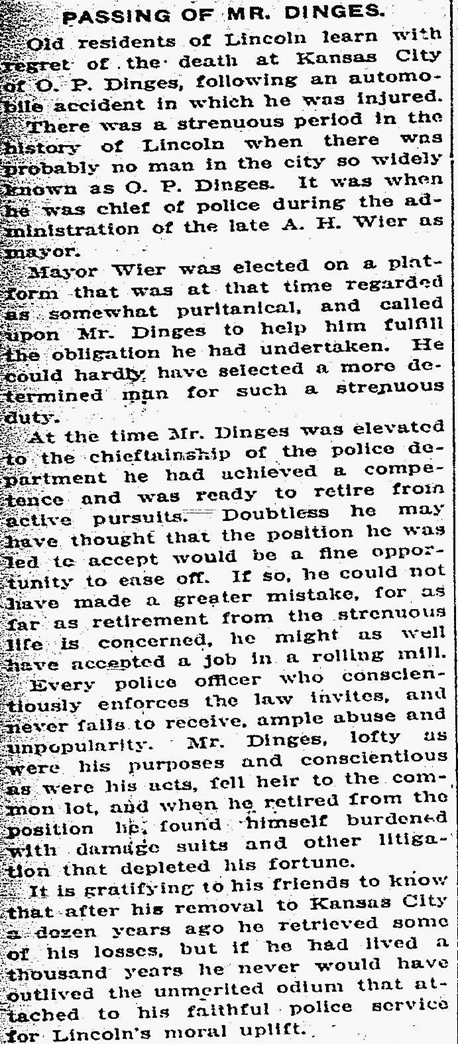 Mayor Wier was elected on a platform that was at that time regarded as somewhat puritanical, and called upon Mr. Dinges to help him fulfill the obligation he had undertaken. He could hardly have selected a more determined man for such a strenuous duty.
Mayor Wier was elected on a platform that was at that time regarded as somewhat puritanical, and called upon Mr. Dinges to help him fulfill the obligation he had undertaken. He could hardly have selected a more determined man for such a strenuous duty.
At the time Mr. Dinges was elevated to the chieftainship of the police department he had achieved a competence and was ready to retire from active pursuits. Doubtless he may have thought that the position he was led to accept would be a fine opportunity to ease off. If so, he could not have made a greater mistake, for as far as retirement from the strenuous life is concerned, he might as well have accepted a job in a rolling mill.
Every police officer who conscientiously enforces the law invites, and never fails to receive ample abuse and unpopularity. Mr. Dinges, lofty as were his purposes and conscientious as were his acts, fell heir to the common lot, and when he retired from the position he found himself burdened with damage suits and other litigation that depleted his fortune.
It is gratifying to his friends to know that after his removal to Kansas City a dozen years ago he retrieved some of his losses, but if he had lived a thousand he never would have outlived the unmerited odium that attached to his faithful police service for Lincoln's moral uplift.
Oliver Perry Dinges is now buried in Forest Hill Cemetery, Kansas City, MO. Along with his wife and son.
Chief from 1892 - 1893
Louis Otto was born on December 15, 1853 in Saxony, Germany. He lived there until roughly 1868, when he immigrated to Downers Grove, Dupage, Illinois. He married his wife, Louisa (Wolff) Otto (1857-1932), in Illinois in 1879. They had at least six children: Fred William Otto (1879-1963), Louis F. Otto (1884-1960), Amanda J. Otto (1883-1972), and Jeanette Louise Otto (1893-1990). The other two died young and their names are unknown.
Around 1880 Louis, his wife, and their son Fred moved to Bennett, Nebraska where Louis worked as a hotel keeper. Not too long after, they moved to Lincoln. Louis worked for a while as a clerk. In 1892, Louis Otto was appointed the position of police chief. In 1893, Otto left the position of chief, but he remained a part of the police department at least until 1897.
Eventually, Louis Otto moved to Portland, Oregon where he lived until his death on November 18, 1923. It is believed that he is buried in Forest View Cemetery, Forest Grove, Washington County, Oregon.
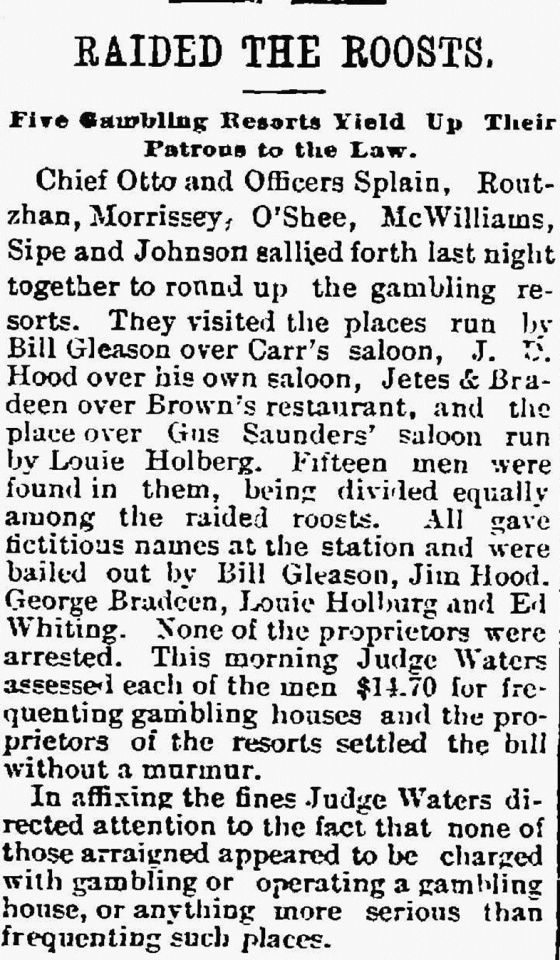 Lincoln Nebraska Evening News - Thursday, February 9, 1893
Lincoln Nebraska Evening News - Thursday, February 9, 1893
Headline: Raided The Roosts.
Byline: Five Gambling Resorts Yield Up Their Patrons to the Law.
Chief Otto and Officer's Splain, Routzahn, Morrissey, O'Shee, McWilliams, Sipe, and Johnson sallied forth last night together to round up the gambling resorts. They visited the places run by Bill Gleason over Carr's Saloon, J. D. Hood over his own saloon, Jetes & Bradeen over Brown's restaurant, and the place over Gus Saunders' saloon run by Louie Holburg. Fifteen men were found in them, being divided equally among the raided roosts. All gave fictitious names at the station and were bailed out by Bill Gleason, Jim Hood, George Bradeen, Louie Holbuge and Ed Whiting. None of the proprietors were arrested. This morning Judge Waters assessed each of the men $14.70 (about $350 present day value) for frequenting gambling houses and the proprietors of the resorts settled the bill without a murmur. In affixing the fines Judge Waters directed attention to the fact that none of those arraigned appeared to be charged with gambling or operating a gambling house, or anything more serious than frequenting such places.
Chief from 1887 - 1888; 1893 - 1895; 1905 - 1909
 Phillip H. Cooper was born April 11, 1831 in New York where he lived until the age of twenty-two. He married Sarah (Hill) Cooper in 1855. They had five children in all. In order their children were Willard Cooper, Ida (Cooper) Hyde, Sam Cooper, John Cooper, and Sadie Cooper.
Phillip H. Cooper was born April 11, 1831 in New York where he lived until the age of twenty-two. He married Sarah (Hill) Cooper in 1855. They had five children in all. In order their children were Willard Cooper, Ida (Cooper) Hyde, Sam Cooper, John Cooper, and Sadie Cooper.
P.H. Cooper was appointed Lincoln's first chief of police upon the city of Lincoln being proclaimed a "City of First Class" on March 25, 1887. The responsibilities of the chief of police were not new to Cooper as he held the position of city marshal from 1874-1877. In fact, Cooper held the position of chief of police for a total of thirteen years spanning three terms from 1877 to his retirement in May of 1909.
Cooper arrived in Lincoln in November of 1869 and was known as the "ice king," being the owner of the only ice plant in Lincoln. He was also heavily involved in Democratic politics in an area that was predominantly Republican. He was seldom absent from Democratic gatherings and few conventions were held that did not have him as a delegate.
Cooper's popularity as marshal and chief of police was earned by his kindness and good nature, although he was known to be outspoken and pointed when necessary. Some of Cooper's responsibilities as chief of police included the control of drunkenness, segregation and gambling houses. John Sheedy, the victim of one of Lincoln's most infamous murders in 1891, was a fellow Democrat and friend of Cooper that owned a gambling house in the city. Despite the friendship, Cooper readily raided Sheedy's establishment whenever the mayor requested. Cooper understood and performed his duties as chief of police despite the circumstance.
Cooper's obituary in the June 7, 1918 Evening State Journal and Lincoln Daily News speaks of his popularity by stating that "[f]or a period of about forty years the name of P.H. Cooper appears in the columns of the Journal about as often, on an average, as that of any other citizen." Between his ice business, involvement in politics and time served as marshal and chief of police, few people were more favorably known in Lincoln than P.H. Cooper.
 Evening State Journal and Lincoln Daily News - Friday, June 7, 1918
Evening State Journal and Lincoln Daily News - Friday, June 7, 1918
Headline: P. H. Cooper Passes Away. Veteran Lincoln Police Chief Dies at His Home. Was Head of the Department for Thirteen years and a Pioneer Business Man.
P.H. Cooper. Pioneer citizen of Lincoln for many years prominent in political activities, died at 4:20 Friday morning, at the home of his son, John Cooper, 1412 B Street. Mr. Cooper had been filing in health for several years and took to his bed two months prior to his death. He was eighty-seven years old and is survived by one son, John, with whom he lived at the time of his death. A daughter, (Mrs. E. B. Hyde) died in 1900, and a son, Willard, died six or eight years ago.
Mr. Cooper came to Lincoln in November of 1869 by stage. Prior to that time he was a freighter over the plains and many stories are told of his experiences while working in that capacity. For many years he was known in Lincoln as the "Ice King" being the owner of the only ice plant here. He held the position of chief of police for a total of thirteen years, retiring from his last term in May 1909. In 1873 he was elected marshal under Mayor R.D. Silvers. In 1874 he was again chosen marshal under W. Littles. He served under R. D. Silvers in 1876 and for a short time under R. B. Graham. From 1887 to 1889 he served during the term of A. J. Sawyer and from 1893 to 1895 under Mayor A. H. Weir. His last two terms were under Mayor Brown. He was at one time a candidate for sheriff.
For a period of about forty years the name P. H. Cooper appears in the columns of the Journal about as often on an average as that of any other citizen. He was prominent as an ice dealer in the early days. His wagons covered the whole town and his name was indissolubly linked with that industry. He managed his affairs in the easy style that prevailed among business men at that time more than at present, and it is doubtful if he made a great deal of money. One reason for this was his kindness and his good nature. He never liked to press a creditor and would often talk with men in a friendly way and pass on without presenting a bill he had in his pocket, although he may have needed the money sorely.
A second cause for the appearance of his name in the paper frequently was his prominence in democratic politics. He was a member of the small group of old fashioned democrats who kept their organization and made regular campaigns in a city, county and state that had overwhelming republican majorities. Mr. Cooper was always present at democratic gatherings. Few conversations were held in forty years that did not have him as a delegate, usually from the Fourth ward. His homestead was at the northeast corner of Sixteenth and H streets where city buildings now stands. He lived there in a modest cottage amid a clump of overgreens until the ground was taken over for public purposes, about ten years ago.
A third element in Mr. Cooper's prominence was his repeated service as marshal and chief of police of the city of Lincoln. He was a careful and conscientious officer, but here again his kindness and good nature interfered somewhat with 100 per cent efficiency, according to modern standards. He introduced the human element into his work more than would be allowed at this time. Most of his service was performed when the city was small and everybody knew everybody else. His easy methods were popular in that stage of the development of the community. His work had to do mainly with the herding in of "drunks" the intervals with the management of real criminal. Whenever it was his duty to make an arrest he acted with plenty of vigor and courage when those qualities pointed in his statements. Those who knew him realized how easy it was to reach his heart.
 During a good part of Mr. Cooper's early career, open gambling houses were in operation in Lincoln. Many of the men of the little frontier city believed that they were "good for business" and used all their influence to see that the raids upon them were made with a velvet touch. John Sheedy was the king bee of the gamblers until he was killed by a negro a quarter of a century ago. He was a strong democratic politician and must have read the riot act in private to Marshal Cooper many a time and often, yet whenever the mayor of the city decided that it was necessary to make a raid, the police chief went at the business just as if he enjoyed it. Those were liberal easy-going days, without much desire on the part of leading citizens to see the law enforced strictly. It is considered very much to Mr. Cooper's credit that he went thru so many experiences in the police department thru so long a period retaining his friendship and his reputation for personal integrity to the last.
During a good part of Mr. Cooper's early career, open gambling houses were in operation in Lincoln. Many of the men of the little frontier city believed that they were "good for business" and used all their influence to see that the raids upon them were made with a velvet touch. John Sheedy was the king bee of the gamblers until he was killed by a negro a quarter of a century ago. He was a strong democratic politician and must have read the riot act in private to Marshal Cooper many a time and often, yet whenever the mayor of the city decided that it was necessary to make a raid, the police chief went at the business just as if he enjoyed it. Those were liberal easy-going days, without much desire on the part of leading citizens to see the law enforced strictly. It is considered very much to Mr. Cooper's credit that he went thru so many experiences in the police department thru so long a period retaining his friendship and his reputation for personal integrity to the last.
Funeral services will be conducted from St. Paul's M. E. church Sunday afternoon.
Phillip Cooper had been failing in health for several years and took to his bed two months prior to his death. He was 87 years old. He is buried in the Wyuka Cemetery along with his wife, Sarah, in Lincoln, Nebraska.
Chief from 1890 - 1891 and 1895 - 1898
 Born in Clinton, New Jersey on March 24, 1853, Melick's family migrated to Marshall County, Illinois around 1859. He worked on his father's farm and pursued his education at the common school and Marshall College of Illinois.
Born in Clinton, New Jersey on March 24, 1853, Melick's family migrated to Marshall County, Illinois around 1859. He worked on his father's farm and pursued his education at the common school and Marshall College of Illinois.
In the spring of 1870, Melick moved to Lancaster County, Nebraska and acquired a homestead claim on Section 22, Rock Creek precinct. He lived there for ten years until he was appointed deputy sheriff under Granville Ensign in 1880. In the fall of 1883, he was elected sheriff, a position he retained for six years. In 1890 he was appointed as the chief of police of Lincoln and after a year and a half was appointed Deputy United States Marshal under Marshal Brad D. Slaughter. When Frank Graham was elected mayor, Melick once again was appointed chief of police. As a major law-enforcement figure in the city, Melick took initiative against the Lincoln male subculture of saloons, gambling halls, and commercialized sex.
When John Sheedy was attacked in January of 1891, Melick arrived with Doctor C. S. Hart at the scene of the crime and questioned Mary Sheedy about the incident. The following day Melick and Detective James Malone interrogated residents and patrons in Lincoln's demimonde in search of witnesses; their investigation led to the arrest of Monday McFarland. Once in jail, McFarland confessed (allegedly by coercion) to participating in a plot with Mary Sheedy to kill John Sheedy.
Melick was active in the Republican Party in Lancaster County and owned shares of stock in the Nebraska Stock Yards. He belonged to Masonic Lodge No. 54, was "a standard bearer of Mount Moriah Commandery No. 4," a charter member of Elks Lodge No. 80 and also belonged to the Knights of Pythias Central City Lodge No. 68. According to one source, Melick was "one of the best known citizens of Lancaster County." He earned the title of colonel by serving on the staffs of Governors Dietrich, Savage, and John H. Mickey, and was popularly known as Colonel Melick, a "public-spirited and progressive citizen."
 After retiring briefly, Melick took up detective work as a representative of the Nebraska Banking Association to assist in apprehending bank robbers. In 1912, he became warden of the penitentiary, a position he held for ten months before becoming a United States mail contractor. In his later years, Melick also dealt with real estate in Lincoln.
After retiring briefly, Melick took up detective work as a representative of the Nebraska Banking Association to assist in apprehending bank robbers. In 1912, he became warden of the penitentiary, a position he held for ten months before becoming a United States mail contractor. In his later years, Melick also dealt with real estate in Lincoln.
In 1866, Melick married Moly Ogan of Washington County, Iowa; they had three children before Moly died in June of 1880. He re-married in 1883 to Kittie Langdon of Janesville, Wisconsin. Melick's sole son, Harry Hastings, was born in Lincoln on June 18, 1888 and moved to New York City to pursue a career in the theatrical business. Melick lived at 903 K Street until around 1890 when he moved into a house at 2444 P Street. As police chief he operated out of a building at 309 N. Tenth Street.
Obituary - Lincoln Star - January 22, 1923
Headline: S.M. Melick Passes Away: Former Warden of Nebraska State Penitentiary and Long a Peace Officer in Lancaster County, Dies Monday Morning
Served as Police Chief and Sheriff
Placed in Charge of Prison Following Outbreak in 1812 When Four Officials Were Killed - Was Well Known Throughout the State
Samuel M. Melick, 70, former warden of the Nebraska state penitentiary, and for many years a peace officer in Lancaster county, died at 9:30 a.m., Monday at his home at Melick Court from heart and kidney disease after an illness of a year's duration.
Mr. Melick has been confined to his bed for the last six months and only twice during that period was he able to leave his home.
Mr. Melick had served for several years as chief of police of this city and six years as sheriff of Lancaster County. He spent several years as detective for the Nebraska Bankers' association and apprehended a number of notorious bank robbers. Mr. Melick had also served as deputy United States Marshall.
In the spring of 1890, he settled on a homestead claim in Lancaster County in Rock Creek precinct, where he lived until he was appointed deputy sheriff under Granville Ensign and filled that position from 1880 until the fall of 1883, when he was elected to the office of sheriff, which he held through reelection for six years. Mr. Melick retired from that office in 1890 and was appointed chief of police of Lincoln. He was appointed deputy United States marshal under Marshal Brad D. Slaughter and served the governor until Mayor Frank Graham was elected when he was again appointed chief of police. Mr. Melick later took up detective work as a representative of the Nebraska Banking association to aid in apprehending bank robbers.
 It was while he was engaged in detective work in 1912, that the outbreak in the state penitentiary occurred and Warden James Delahunty, two deputy wardens and one usher were killed by the prisoners. The militia was placed in charge and Mr. Melick was made warden of the state penitentiary. Under his control affairs were placed on safe and normal basts. He held that position for ten months.
It was while he was engaged in detective work in 1912, that the outbreak in the state penitentiary occurred and Warden James Delahunty, two deputy wardens and one usher were killed by the prisoners. The militia was placed in charge and Mr. Melick was made warden of the state penitentiary. Under his control affairs were placed on safe and normal basts. He held that position for ten months.
Mr. Melick had made investments from time to time in real estate in Lincoln and had large property holdings in the city at the time of his death.
Active In Community Affairs
He was prominent in Masonic circles in which he had attained high rank. He was a standard bearer of Mount Moriah, Commandery no. 4 for fourteen years. He was also a charter member of Elks lodge, No. 80. of Lincoln. He had the social qualities and the sterling traits of character which win friendship and regard. In many ways he had been connected with public life of the community and his attitude had always been that of a public-spirited progressive citizen. He served on the staffs of Governors Dietrich, Savage and John H. Mickey.
Samuel Miller Melick was born in Clinton, Hunterdon County, N.J., March 24, 1853, a son of Peter and Jarre Maria (Miller) Melick. He was a lad of eight years when his family removed to Illinois, where he acquired a common school education and later attended Marshall College of Illinois. His practical training was received in farm work under his father.
The marriage of Mr. Melick to Miss Kittie Langdon, of Lincoln, occurred December 29, 1883. Besides his wife he is survived by two daughters miss Minnie Melick and Mrs. Mae McCandless of California, who left Sunday for Lincoln on account of the serious illness of their father. His son, Harry H. Melick, was killed during the war.
The body is being held at the home pending the funeral.
Melick's body is buried in Wyuka Cemetery in Lincoln, Nebraska along with his wife Kittie, and son, Harry.
Chief from 1898 - 1899
J. D. Parker was born in Illinois on February 21, 1861. He got married to Hattie C (McCasland) Parker (1864-1923) in 1891.
In an article from the Nebraska State Journal it talks about a hunting trip that Parker took with Ernst Hunger, who later became chief of police as well.
Nebraska State Journal Tuesday, October 26, 1897.
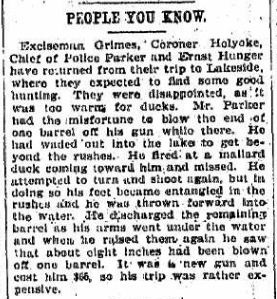 Headline: People You Know
Headline: People You Know
Exciseman Grimes, Coroner Holyoke, Chief of Police Parker and Ernst Hunger have returned from their trip to Lakeside, where they expected to find some good hunting. They were disappointed, as it had been too warm for ducks. Mr. Parker had the misfortune to blow the end of one barrel off his gun while there. He had waded out into the lake to get beyond the rushes. He fired at a mallard duck coming toward him and missed. He attempted to turn and shoot again, but in doing so his foot became entangled in the rushes and he was thrown forward into the water. He discharged the remaining barrel as his arms went under the water and when he raised them again he saw that about eight inches had been blown off one barrel. It was a new gun and cost him $65, so his trip was rather expensive.
Obituary - The Lincoln Star - April 25, 1924
Headline: Death Calls J.D. Parker, Former Chief of Police
J.D. Parker, police chief under Mayor Graham in 1895, died at a Kansas City hospital at 10 a.m. Sunday, according to word received by Lincoln relatives Sunday evening. He had been in the Excelsior Springs hospital for thirteen weeks. Mr. Parker was a resident of Lincoln for many years and moved to Liberty, Mo., about fifteen years ago. Mrs. Parker died a year ago.
He helped organize the Lincoln Ice Company which was later absorbed by one of the present creameries. He served on the city council from the second ward.
He leaves two sisters of Lincoln, Mrs. A.E. Metcalf, 324 South Twenty Fourth Street, and Mrs. Frank E. parks, 2650 C Street, and a half-brother, J.F. Hutchins, 2120 B Street. He also leaves a brother, H.A. Parker of Excelsior Springs, Mo.
Mr. and Mrs. Metcalf and Mr. and Mrs. Parks and son left early Monday morning for Liberty, Mo., where the funeral will be held Tuesday at 2 p.m.
J. D. Parker is now buried in Fairview Cemetery, Liberty, Clay County, Missouri along with his wife Hattie.
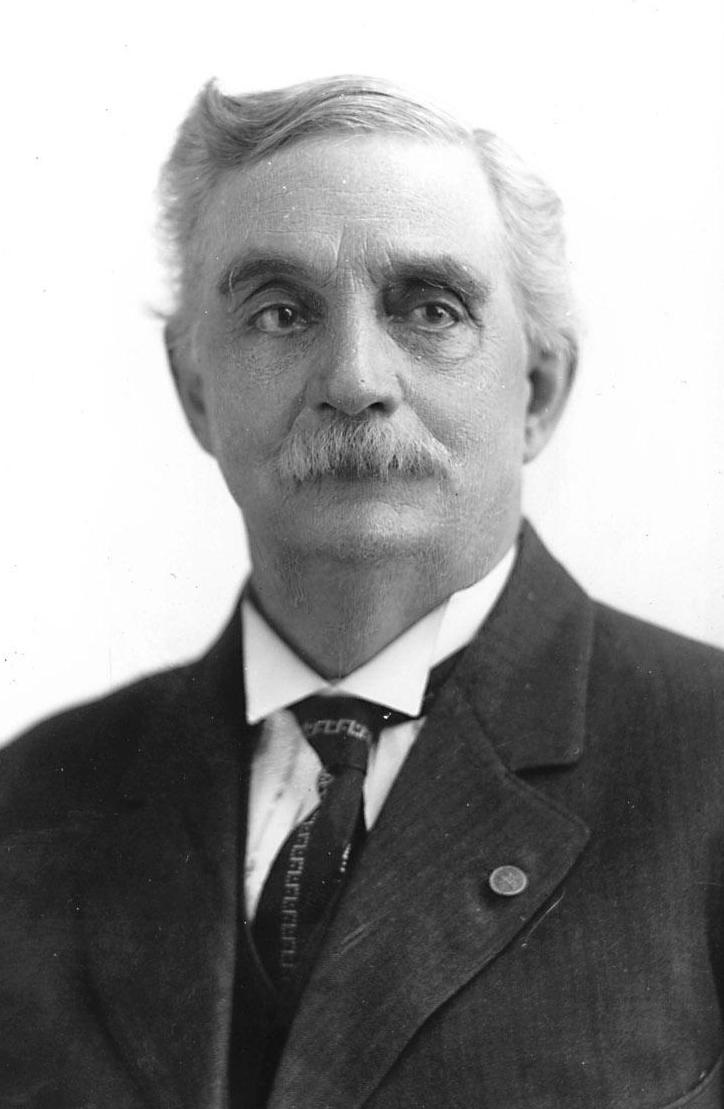 Chief from 1899 - 1903
Chief from 1899 - 1903
Henry Hoagland was born on November 2, 1842 in Somerset County, New Jersey. He attended Eastman Commercial College in Chicago. He married Marietta Randolph in February 1867 in Bunker Hill, Illinois. Together they had three children Frank Hoagland, Albert Hoagland, and Evelyn Hoagland.
Chief Hoagland served the city of Lincoln and Lancaster County in both law enforcement and legislative offices for over half a century. A Civil War veteran originally from Somerset, New Jersey, Hoagland moved to Lincoln in 1878 and served as a deputy sheriff under his brother, Sheriff Joseph S. Hoagland. Hoagland's career with the Lancaster County Sheriff's Office included serving as deputy beneath five sheriffs, as well as holding the office of sheriff from 1908 to 1911. His career with the Lincoln Police Department began in 1895 when he was appointed day captain. He then served as chief deputy for Lancaster County from January 1896 to April 1898 at which time he was appointed chief of police of the Lincoln Police Department.
Chief Hoagland was well-liked by the press and popular amongst citizens. One reporter noted in the Lincoln Evening News dated June 6, 1891 that "[Hoagland] is always genial to reporters, is a fund of reminiscences and a source of joy to the news-hunters on dull days." Hoagland was also beloved for his beliefs in reforming society. The Saturday, May 24, 1902 edition of the Courier takes note of this by stating that "[h]e [Hoagland] is a close and ardent student of criminology, believing that there is some good in everyone and that all except the natural born criminals can be reformed and made useful members of society."
A notable event during Hoagland's time as Chief of Police occurred on September 22, 1900 when four masked men robbed a Burlington train. The men were unable to open the large safe, but went through a smaller one and found only a little money before jumping off the train. Chief Hoagland formed a posse, but was unable to track the robbers.
Hoagland's time as Chief of Police ended in 1903. In 1912, he began a career in politics when he was elected to the Nebraska State Legislature where he served two terms. He was then appointed Court Crier by Federal Judge Munger in 1924 and held this position until his death on February 14, 1930. Chief Hoagland is buried in Wyuka Cemetery along with his wife Marietta Hoagland.
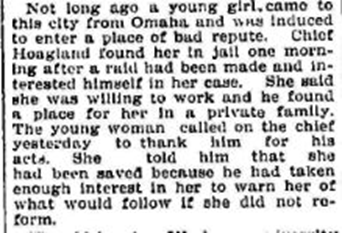 Nebraska State Journal - Sunday, January 27, 1901.
Nebraska State Journal - Sunday, January 27, 1901.
Not long ago a young girl came to this city from Omaha and was induced to enter a place of bad repute. Chief Hoagland found her in jail one morning after a raid had been made and interested himself in her case. She said she was willing to work and he found a place for her in a private family. The young woman called on the chief yesterday to thank him for his acts. She told him that she had been saved because he had taken enough interest in her to warn her of what would follow if she did not reform.
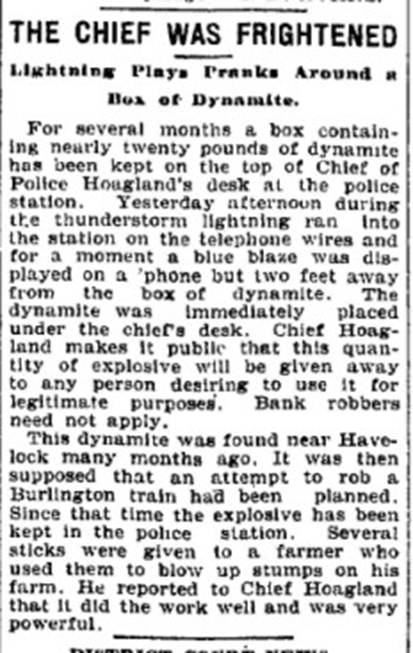 Nebraska State Journal - Tuesday, May 20, 1902.
Nebraska State Journal - Tuesday, May 20, 1902.
Headline: The Chief Was Frightened.
Byline: Lightning Plays Pranks around a Box of Dynamite
For several months a box containing nearly twenty pounds of dynamite has been kept on the top of Chief of Police Hoagland's desk at the police station. Yesterday afternoon during the thunderstorm lightning ran into the station on the telephone wires and for a moment a blue blaze was displayed on a phone but two feet away from the box of dynamite. The dynamite was immediately placed under the chief's desk. Chief Hoagland makes it public that this quantity of explosive will be given away to any person desiring to use it for legitimate purposes. Bank Robbers need not apply.
This dynamite was found near Havelock many months ago. It was then supposed that an attempt to rob a Burlington train had been planned. Since that time the explosive has been kept in the police station. Several sticks were given to a farmer who used them to blow up stumps on his farm. He reported to Chief Hoagland that it did the work well and was very powerful.
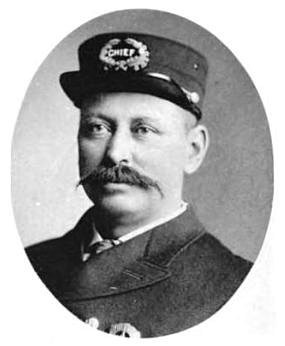 Chief from 1903 - 1904
Chief from 1903 - 1904
Mr. Routzahn is believed to have been born in Michigan around 1861. Routzahn originally worked in agriculture as a farmer before he and his wife Sarah A. (Owens) moved to Lincoln. Routzahn started with the Lincoln Police Department in 1895. He served as a patrol officer, detective, and deputy sheriff before being appointed to chief of police in 1903. Routzahn died January 21, 1920. He is buried in Fairmount Cemetery in Denver, Colorado.
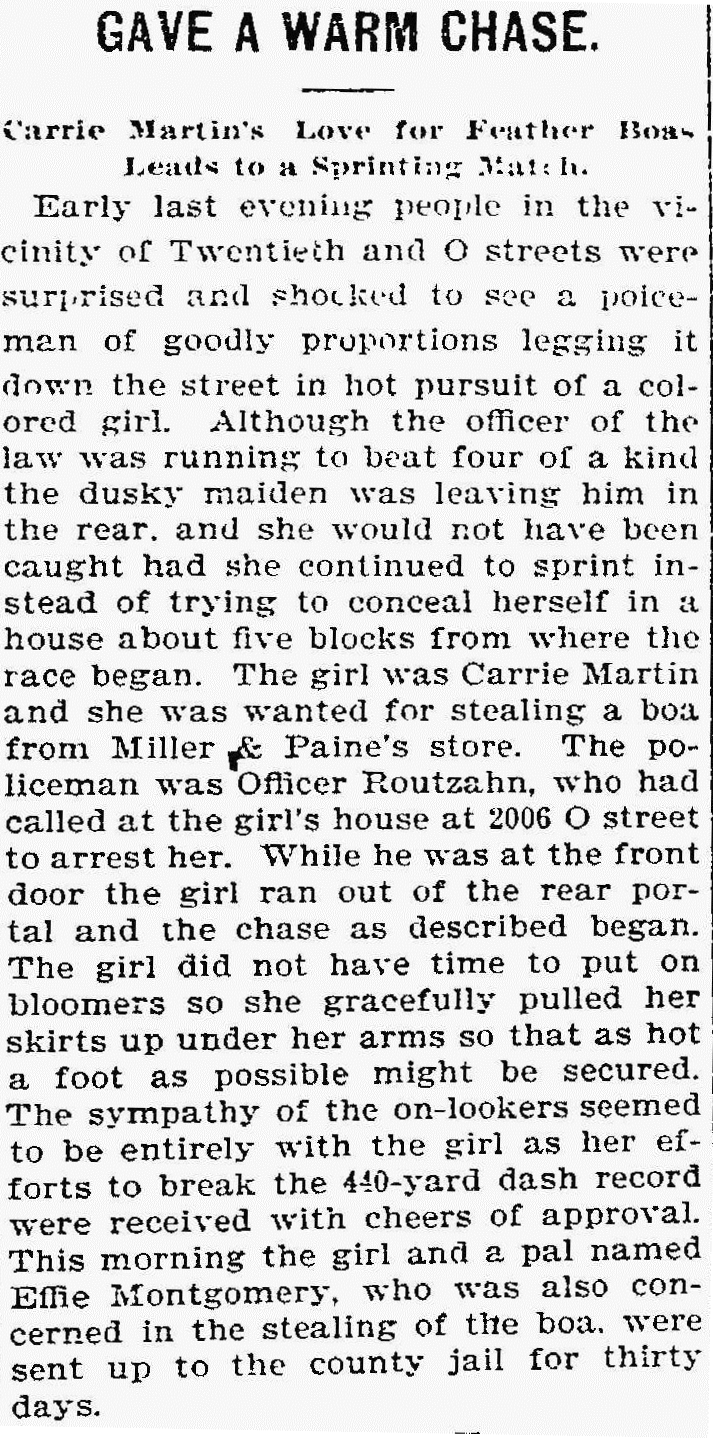 The Evening News, Lincoln, Nebraska - October 3, 1895
The Evening News, Lincoln, Nebraska - October 3, 1895
Headline: Gave a Warm Chase.
Byline: Carrie Martin's Love for a Feather Boa Leads to a Sprinting Match.
Early last evening people in the vicinity of Twentieth and O streets were surprised and shocked to see a policeman of a goodly proportions legging it down the street in hot pursuit of a colored girl. Although the officer of the law was running to beat four of a kind the dusky maiden was leaving him in the rear, and she continued to spring instead of trying to conceal herself in a house about five blocks from where the race had begun. The girl was Carrie Martin and she was wanted for stealing a boa from Miller & Paine's store. The policeman was Officer Routzahn, who had called at the girl's house at 2006 O Street to arrest her. While he was at the front door the girl ran out of the rear portal and the chase as described began. The girl did not have time to put on her bloomers so she gracefully pulled her skirts up under her arms so that as hot a foot as possible might be secured. The sympathy of the on-lookers seemed to be entirely with the girl as her efforts to break the 440-yard dash record were received with cheers of approval. This morning the girl and a pal named Effie Montgomery, who was also concerned in the stealing of the boa, were sent up the county jail for thirty days.
Chief from 1887 - 1888; 1893 - 1895; 1905 - 1909
 Phillip H. Cooper was born April 11, 1831 in New York where he lived until the age of twenty-two. He married Sarah (Hill) Cooper in 1855. They had five children in all. In order their children were Willard Cooper, Ida (Cooper) Hyde, Sam Cooper, John Cooper, and Sadie Cooper.
Phillip H. Cooper was born April 11, 1831 in New York where he lived until the age of twenty-two. He married Sarah (Hill) Cooper in 1855. They had five children in all. In order their children were Willard Cooper, Ida (Cooper) Hyde, Sam Cooper, John Cooper, and Sadie Cooper.
P.H. Cooper was appointed Lincoln's first chief of police upon the city of Lincoln being proclaimed a "City of First Class" on March 25, 1887. The responsibilities of the chief of police were not new to Cooper as he held the position of city marshal from 1874-1877. In fact, Cooper held the position of chief of police for a total of thirteen years spanning three terms from 1877 to his retirement in May of 1909.
Cooper arrived in Lincoln in November of 1869 and was known as the "ice king," being the owner of the only ice plant in Lincoln. He was also heavily involved in Democratic politics in an area that was predominantly Republican. He was seldom absent from Democratic gatherings and few conventions were held that did not have him as a delegate.
Cooper's popularity as marshal and chief of police was earned by his kindness and good nature, although he was known to be outspoken and pointed when necessary. Some of Cooper's responsibilities as chief of police included the control of drunkenness, segregation and gambling houses. John Sheedy, the victim of one of Lincoln's most infamous murders in 1891, was a fellow Democrat and friend of Cooper that owned a gambling house in the city. Despite the friendship, Cooper readily raided Sheedy's establishment whenever the mayor requested. Cooper understood and performed his duties as chief of police despite the circumstance.
Cooper's obituary in the June 7, 1918 Evening State Journal and Lincoln Daily News speaks of his popularity by stating that "[f]or a period of about forty years the name of P.H. Cooper appears in the columns of the Journal about as often, on an average, as that of any other citizen." Between his ice business, involvement in politics and time served as marshal and chief of police, few people were more favorably known in Lincoln than P.H. Cooper.
 Evening State Journal and Lincoln Daily News - Friday, June 7, 1918
Evening State Journal and Lincoln Daily News - Friday, June 7, 1918
Headline: P. H. Cooper Passes Away. Veteran Lincoln Police Chief Dies at His Home. Was Head of the Department for Thirteen years and a Pioneer Business Man.
P.H. Cooper. Pioneer citizen of Lincoln for many years prominent in political activities, died at 4:20 Friday morning, at the home of his son, John Cooper, 1412 B Street. Mr. Cooper had been filing in health for several years and took to his bed two months prior to his death. He was eighty-seven years old and is survived by one son, John, with whom he lived at the time of his death. A daughter, (Mrs. E. B. Hyde) died in 1900, and a son, Willard, died six or eight years ago.
Mr. Cooper came to Lincoln in November of 1869 by stage. Prior to that time he was a freighter over the plains and many stories are told of his experiences while working in that capacity. For many years he was known in Lincoln as the "Ice King" being the owner of the only ice plant here. He held the position of chief of police for a total of thirteen years, retiring from his last term in May 1909. In 1873 he was elected marshal under Mayor R.D. Silvers. In 1874 he was again chosen marshal under W. Littles. He served under R. D. Silvers in 1876 and for a short time under R. B. Graham. From 1887 to 1889 he served during the term of A. J. Sawyer and from 1893 to 1895 under Mayor A. H. Weir. His last two terms were under Mayor Brown. He was at one time a candidate for sheriff.
For a period of about forty years the name P. H. Cooper appears in the columns of the Journal about as often on an average as that of any other citizen. He was prominent as an ice dealer in the early days. His wagons covered the whole town and his name was indissolubly linked with that industry. He managed his affairs in the easy style that prevailed among business men at that time more than at present, and it is doubtful if he made a great deal of money. One reason for this was his kindness and his good nature. He never liked to press a creditor and would often talk with men in a friendly way and pass on without presenting a bill he had in his pocket, although he may have needed the money sorely.
A second cause for the appearance of his name in the paper frequently was his prominence in democratic politics. He was a member of the small group of old fashioned democrats who kept their organization and made regular campaigns in a city, county and state that had overwhelming republican majorities. Mr. Cooper was always present at democratic gatherings. Few conversations were held in forty years that did not have him as a delegate, usually from the Fourth ward. His homestead was at the northeast corner of Sixteenth and H streets where city buildings now stands. He lived there in a modest cottage amid a clump of overgreens until the ground was taken over for public purposes, about ten years ago.
A third element in Mr. Cooper's prominence was his repeated service as marshal and chief of police of the city of Lincoln. He was a careful and conscientious officer, but here again his kindness and good nature interfered somewhat with 100 per cent efficiency, according to modern standards. He introduced the human element into his work more than would be allowed at this time. Most of his service was performed when the city was small and everybody knew everybody else. His easy methods were popular in that stage of the development of the community. His work had to do mainly with the herding in of "drunks" the intervals with the management of real criminal. Whenever it was his duty to make an arrest he acted with plenty of vigor and courage when those qualities pointed in his statements. Those who knew him realized how easy it was to reach his heart.
 During a good part of Mr. Cooper's early career, open gambling houses were in operation in Lincoln. Many of the men of the little frontier city believed that they were "good for business" and used all their influence to see that the raids upon them were made with a velvet touch. John Sheedy was the king bee of the gamblers until he was killed by a negro a quarter of a century ago. He was a strong democratic politician and must have read the riot act in private to Marshal Cooper many a time and often, yet whenever the mayor of the city decided that it was necessary to make a raid, the police chief went at the business just as if he enjoyed it. Those were liberal easy-going days, without much desire on the part of leading citizens to see the law enforced strictly. It is considered very much to Mr. Cooper's credit that he went thru so many experiences in the police department thru so long a period retaining his friendship and his reputation for personal integrity to the last.
During a good part of Mr. Cooper's early career, open gambling houses were in operation in Lincoln. Many of the men of the little frontier city believed that they were "good for business" and used all their influence to see that the raids upon them were made with a velvet touch. John Sheedy was the king bee of the gamblers until he was killed by a negro a quarter of a century ago. He was a strong democratic politician and must have read the riot act in private to Marshal Cooper many a time and often, yet whenever the mayor of the city decided that it was necessary to make a raid, the police chief went at the business just as if he enjoyed it. Those were liberal easy-going days, without much desire on the part of leading citizens to see the law enforced strictly. It is considered very much to Mr. Cooper's credit that he went thru so many experiences in the police department thru so long a period retaining his friendship and his reputation for personal integrity to the last.
Funeral services will be conducted from St. Paul's M. E. church Sunday afternoon.
Phillip Cooper had been failing in health for several years and took to his bed two months prior to his death. He was 87 years old. He is buried in the Wyuka Cemetery along with his wife, Sarah, in Lincoln, Nebraska.

 Chief from June 1 - October 15, 1909
Chief from June 1 - October 15, 1909
The retirement of P.H. Cooper in May of 1909 led to the appointment of Fred J. Rickard as Lincoln's newest chief of police. It was no surprise that Rickard acquired the position as rumors suggested the appointing board strongly favored him over other candidates. Rickard's first day as chief was June 1, 1909.
Rickard, a former detective, was large in stature and unafraid of controversy. This was validated during an episode in early 1909 when Rickard arrested the son of a prominent Lincoln citizen for breaking windows at a local school building. The father filed a complaint against Rickard for arresting his son "unwarrantably." A local newspaper caught drift of the story and stated that "[a]dmirers of each of these burly men declare them issesistible forces. Therefore, when they clash, as everybody confidently anticipates, the sparks will fly in sulphurous clouds." Though the confrontation did not result in bodily harm to either party, it did, however, influence the public's perception of Lincoln's twelfth police chief.
During Rickard's tenure as chief, several changes were made within the department including that patrolmen must be at least six feet tall, and roll call being transferred upstairs. Rickard was also adamant of ridding the city of hoboes, wanderers, vagrants and uncleanliness. One way in which he intended to do so was by dumping several loads of large rocks in Market square giving prisoners, convicted vagrants and suspicious characters plenty of "exercise." He also issued orders that alleys in the city were to be kept clean, and those who neglected to do so would find themselves in police court. There was no denying that Chief Rickard enforced the law to ensure Lincoln become a reputable city.
Less than five months after being appointed chief, the excise board accepted the resignation of Chief Rickard on October 15, 1909. The reason for the resignation is unclear and was not made available to the public. Rickard did, however, accept a position as a plain clothes officer for the police department at the time of his resignation.
Obituary - The Lincoln Star - September 5, 1946
RICKARD, FRED J. - Fred J. Rickard, 79, died at a local nursing home Thursday morning. Surviving are a daughter, Alyce Meehan, of Lincoln, a brother Lyman Rickard, Waterloo, Ia., eight grandchildren, and one great-grandchild. Funeral services will be held at 3 p.m. Friday at Uberger's chapel. Rev. J. Edwin Jarboe officiating. Burial in Havelock cemetery. The police department will furnish a motorcycle escort and pallbearers. The family requests no flowers.
Chief from 1909 - 1911, 1914 - 1915, and 1916 - 1918
James Malone was a long-time figure of law enforcement in Lincoln.
Malone was born on December 15, 1858 to Robert and Mary Malone in Peoria, Illinois. In 1884 or 1885, he moved to Lincoln and worked as a hackman for Granville Ensign's baggage line. He later joined the police force for a year and then worked as a detective for the Burlington and Missouri River Railroad.
Malone was a detective in the Lincoln municipal police force at the time of the infamous John Sheedy murder case in 1891. Malone, along with two doctors and officers Kinney, Otto, and Adams arrived at Sheedy's residence Sunday evening, January 11, after hearing a revolver fired in the street. After Sheedy's death, Malone along with Chief of Police Samuel Melick arrested Monday McFarland for the crime. Malone was chiefly responsible for interrogating McFarland, for which his tactics were later questioned. He was accused of not only threatening to turn McFarland over to a lynch mob, but also of promising immunity if McFarland confessed to the murder.
Malone went on to achieve much prominence in Lincoln as the chief of police; at the time of his death, he was serving his third term as such. He also served many years as the chief special agent for the Burlington and Missouri River Railroad and assisted the Nebraska Bankers Association in their long-time battle against bank robbers. Malone developed new criminal foes in this position, the most noted being gang leader "Shorty" Gray who orchestrated bank robberies in Oklahoma, Kansas, and Nebraska. Around 1910, Malone arrested Gray and some of his gang on a small island near Grand Island, Nebraska after chasing them for nearly a week. In 1913, Gray escaped from prison killing four prison guards in the process. However, Malone tracked him down again leading Gray to commit suicide.
Malone first resided in Stover's boarding house but soon after moved into a room on the second floor of the building at 242 North Tenth Street, where he still lived at the time of Sheedy's murder. The police headquarters, where he most likely spent much of his time, were located at the corner of North Tenth and Q streets near his residence.
An outspoken and flamboyant man, James Malone was a fixture around the square, feared, criticized, and admired for his aggressive manner. He was police chief for three terms, a position he held until his death in 1918.
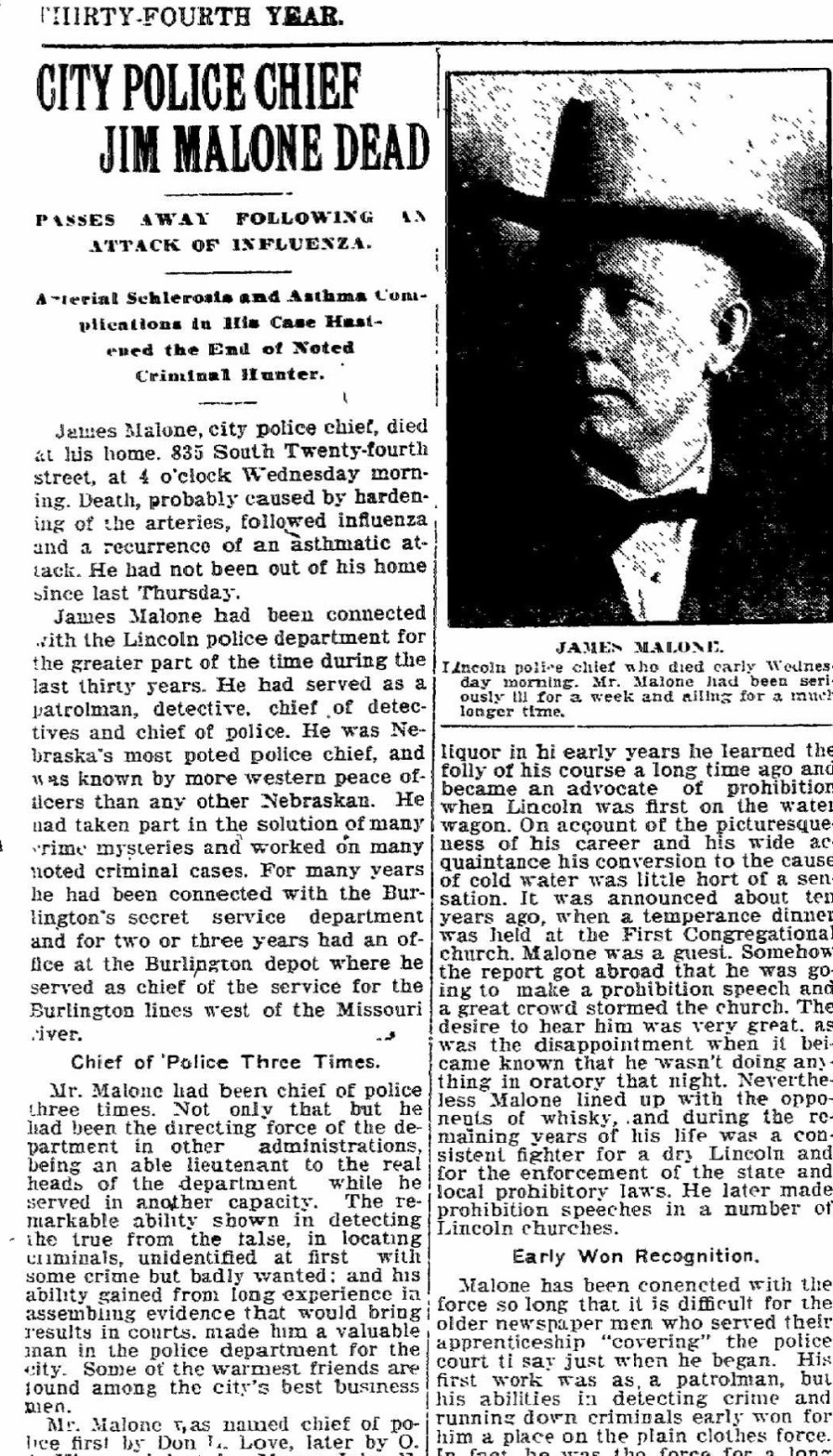
Chief from 1911 - 1913
Ernest T. Hunger was born the son of a Lutheran minister, in Pritzie, Germany, on December 18, 1836. Once older, he served seven years in the German Army, fighting in two wars. He fought in the German War against Austria in 1966, and in the Frannco-Prussian war. In the Battle of Metz, he lost a finger on his left hand.
He moved to America around 1871. He settled in Lincoln in 1877, joined the police department, and married Frances. They were together for over thirty years. Frances and Ernest had two children together, Paul and Ella. Their daughter later married a man by the name of Jesse Todd.
The obituary below gives us great insight into the life of Mr. Hunger.
Obituary - The Lincoln Star - February 7, 1925
Headline: Former Chief Hunger Dies at His Home
Byline: Well Known Peace Officer Succumbs Saturday As Result Stroke: Lincoln Resident Since 1877 - Fought in Two Wars As German Soldier
Ernest Theodore Hunger, 88, former Lincoln police chief and resident here for forty-five years, died at his home, 2814 Randolph street, at 5:30 a.m. Saturday as the result of a stroke that he suffered last July and another in December.
Mr. Hunger was well known as a sportsman and also as a constable in local justice courts. He was head of the police department under the administration of Mayor A.H. Armstrong.
Born in Pritzie, Prussia, December 18, 1836, Mr. Hungar was the son of a Lutheran minister. He served seven years in the German army, went through the war with Austria in 1866, and the Frannco-Prussian war. He was with the troops that drove on towards Paris and in the battle of Metz lost a finger of his left hand. Following this struggle he returned home for a time, then accompanied a German nobleman on his travels through Austria, Italy, the Mediterranean countries and Palestine.
In 1874 he came to New York, but soon moved to Philadelphia, then to Yellow Springs and Zenia, O., where he conducted a hotel and baking business and was married to Frances Clarke, March 5, 1877. They moved to Lincoln in 1877.
Was Deputy Game Warden.
Almost immediately he was appointed constable, and under Governor Sheldon was a deputy game warden. He was also a deputy sheriff. While constable he made trips to Utah and Oklahoma for prisoners, and during his service as police chief went to Albany, N.Y., to bring back a man.
Hunting was Mr. Hunger's chief hobby and for many years he journeyed regularly to Montana and other parts of the far west to shoot and fish. For two years, until his health failed him, he was caretaker for a local gun club with headquarters near Ceresco.
Soon after his arrival in this country he took out naturalization papers and during the recent war was a staunch upholder of the American cause. He was a thirty-second degree Mason, a Knight Templar and a member of the Elks.
Though Mr. Hunger partially recovered from the stroke that he suffered, he was never entirely well again and after a second attack, December 24, his condition steadily grew worse. He was last able to be up January 16.
Mrs. Ella M. Todd of Lincoln, a daughter, and one grandchild survive him. Two daughters died in infancy and a son, Paul Clarke, died in 1901. Mrs. Hunger passed away in 1912.
Funeral services will be held at 2 p.m. Monday at the First Baptist church, Fourteenth and K streets. Rev. W.T. Elmore will officiate Burial in Wyuka.
An article, submitted on November 20, 2012, by the Nebraska State Historical Society talks about how Hunger made his own coffin, set it on his porch and would sleep in it at night.
Headline: History of Hunger's coffin
By the start of the 20th century the pain of death had been softened for many Americans. Professional undertakers, rather than family members, laid out and attended the bodies of the deceased, made coffins, dug graves, and directed funeral services.
A few individuals, however, tried to insure that no such attentions would be paid them after death.
In early July of 1914 several Nebraska newspapers published an interview with 97-old Ernst T. Hunger of Lincoln, who had made his own coffin in order to spare his descendants the expense of buying one after his death. Hunger, who kept it on his front porch, also slept in it, pronouncing it "the most comfortable bed I ever got into in my life."
The Kearney Daily Hub on July 8, 1914, published the first paragraphs of the interview with "E.T. Hunger, formerly chief of police of Lincoln [1912-13], [who] sleeps in his coffin. The homemade box stands on the front porch of the Hunger residence, and at night, after the neighbors have gone to bed, 'Old Man' Hunger goes out and climbs into the box. If the weather is cold or if a shower comes up he pulls the top of the coffin over the opening, leaves a crack through which he can get a little fresh air and calmly goes to sleep. Mr. Hunger is now 76 years old, and for many years he has been sleeping in his coffin."
"And I made that coffin myself, too," he says proudly. "Costs too much to die in these days. So I just thought I'd play a joke on the undertakers and make my own coffin while I was well enough to do it. So I got me some inch plank about a foot wide and several pieces of 2 by 4. I put the latter at each corner to make the box stable, and then I nailed it together with eight penny nails. Whole thing cost me less than $5, but it's strong enough to hold a man about my size without any trouble. And won't those undertakers be mad when I die and they can't get any of my money?"
"The Hunger home sits back from the street, and there are trees all around it. In the summer these trees shade the porch and the gruwsome [sic] object cannot be see plainly. But when winter strips the limbs and branches Mr. Hunger's homemade coffin can be seen by all passersby."
Hunger's background was included in an uncut version of the interview published in the Pittsburg (Pennsylvania) Press on July 5, 1914. Born in Germany in 1836, he fought in the Franco-Prussian War and then came into the U.S., where he worked at various positions in a dozen cities, before settling in Lincoln. He served as a constable there, and as Lincoln's chief of police from 1912-1913.
Hunger's dislike of undertakers in 1914 may have arisen from numerous deaths in his family. Two daughters died in infancy, a 23-year-old son in 1901, and his wife in 1912. One daughter survived after his death in 1925. Hunger, his wife, and son are buried in Lincoln's Wyuka Cemetery.
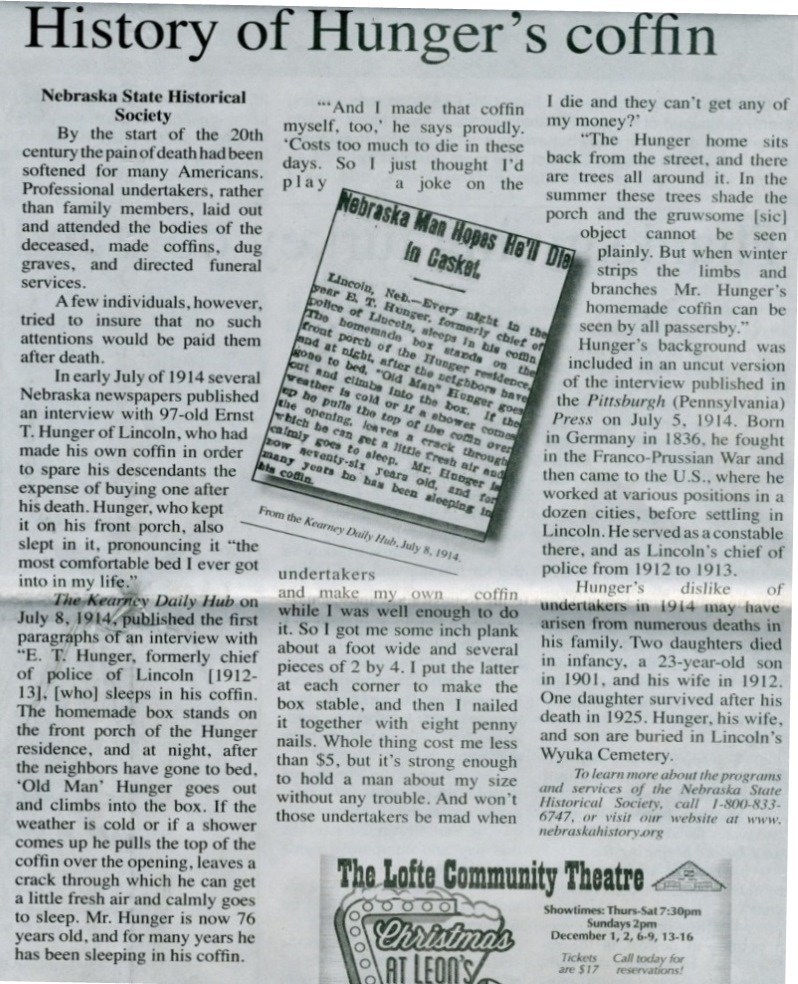
Chief from 1909 - 1911, 1914 - 1915, and 1916 - 1918
James Malone was a long-time figure of law enforcement in Lincoln.
Malone was born on December 15, 1858 to Robert and Mary Malone in Peoria, Illinois. In 1884 or 1885, he moved to Lincoln and worked as a hackman for Granville Ensign's baggage line. He later joined the police force for a year and then worked as a detective for the Burlington and Missouri River Railroad.
Malone was a detective in the Lincoln municipal police force at the time of the infamous John Sheedy murder case in 1891. Malone, along with two doctors and officers Kinney, Otto, and Adams arrived at Sheedy's residence Sunday evening, January 11, after hearing a revolver fired in the street. After Sheedy's death, Malone along with Chief of Police Samuel Melick arrested Monday McFarland for the crime. Malone was chiefly responsible for interrogating McFarland, for which his tactics were later questioned. He was accused of not only threatening to turn McFarland over to a lynch mob, but also of promising immunity if McFarland confessed to the murder.
Malone went on to achieve much prominence in Lincoln as the chief of police; at the time of his death, he was serving his third term as such. He also served many years as the chief special agent for the Burlington and Missouri River Railroad and assisted the Nebraska Bankers Association in their long-time battle against bank robbers. Malone developed new criminal foes in this position, the most noted being gang leader "Shorty" Gray who orchestrated bank robberies in Oklahoma, Kansas, and Nebraska. Around 1910, Malone arrested Gray and some of his gang on a small island near Grand Island, Nebraska after chasing them for nearly a week. In 1913, Gray escaped from prison killing four prison guards in the process. However, Malone tracked him down again leading Gray to commit suicide.
Malone first resided in Stover's boarding house but soon after moved into a room on the second floor of the building at 242 North Tenth Street, where he still lived at the time of Sheedy's murder. The police headquarters, where he most likely spent much of his time, were located at the corner of North Tenth and Q streets near his residence.
An outspoken and flamboyant man, James Malone was a fixture around the square, feared, criticized, and admired for his aggressive manner. He was police chief for three terms, a position he held until his death in 1918.

Chief from 1915-1917
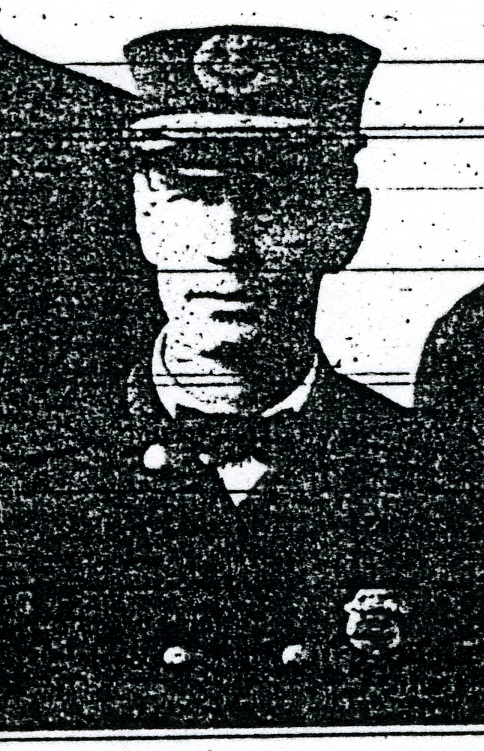 Headline: H.H. Antles, Former Police Chief, Dies
Headline: H.H. Antles, Former Police Chief, Dies
Obituary - The Lincoln Star - November 22, 1946
Howard H. Antles, about 65, one-time Lincoln chief of police and former deputy warden of the Nebraska state penitentiary, died Thursday in Los Angeles Cal., according to word received by relatives here.
He served as police chief from May, 1915, to May, 1917, and as deputy warden in 1915. At one time he was secretary of state public welfare. A veteran of the Spanish war, he also served as a major in World War I.
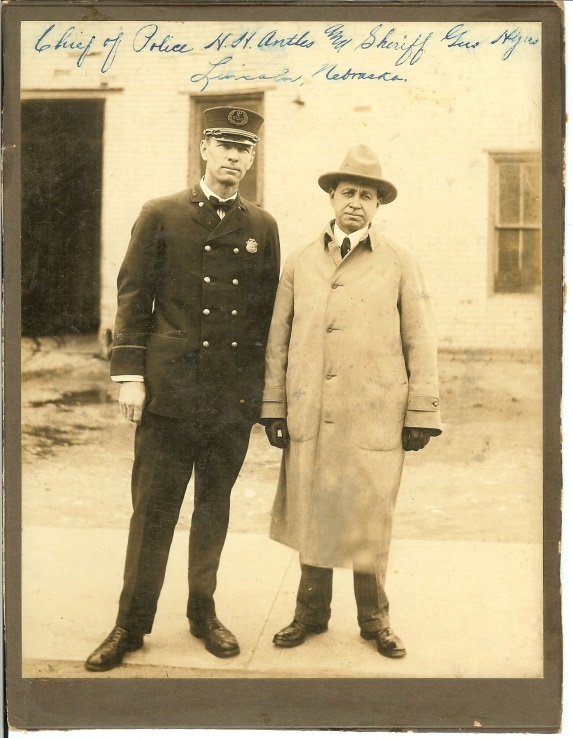 After leaving Lincoln he joined the Security National bank of Los Angeles until 1941, where he resigned because of ill health.
After leaving Lincoln he joined the Security National bank of Los Angeles until 1941, where he resigned because of ill health.
He is survived by his wife, Lou, daughter, Mrs. Tom Lewis, a sister, Mrs. H.M. Wsay, Lincoln, and two grandchildren.
Chief from 1909 - 1911, 1914 - 1915, and 1916 - 1918
James Malone was a long-time figure of law enforcement in Lincoln.
Malone was born on December 15, 1858 to Robert and Mary Malone in Peoria, Illinois. In 1884 or 1885, he moved to Lincoln and worked as a hackman for Granville Ensign's baggage line. He later joined the police force for a year and then worked as a detective for the Burlington and Missouri River Railroad.
Malone was a detective in the Lincoln municipal police force at the time of the infamous John Sheedy murder case in 1891. Malone, along with two doctors and officers Kinney, Otto, and Adams arrived at Sheedy's residence Sunday evening, January 11, after hearing a revolver fired in the street. After Sheedy's death, Malone along with Chief of Police Samuel Melick arrested Monday McFarland for the crime. Malone was chiefly responsible for interrogating McFarland, for which his tactics were later questioned. He was accused of not only threatening to turn McFarland over to a lynch mob, but also of promising immunity if McFarland confessed to the murder.
Malone went on to achieve much prominence in Lincoln as the chief of police; at the time of his death, he was serving his third term as such. He also served many years as the chief special agent for the Burlington and Missouri River Railroad and assisted the Nebraska Bankers Association in their long-time battle against bank robbers. Malone developed new criminal foes in this position, the most noted being gang leader "Shorty" Gray who orchestrated bank robberies in Oklahoma, Kansas, and Nebraska. Around 1910, Malone arrested Gray and some of his gang on a small island near Grand Island, Nebraska after chasing them for nearly a week. In 1913, Gray escaped from prison killing four prison guards in the process. However, Malone tracked him down again leading Gray to commit suicide.
Malone first resided in Stover's boarding house but soon after moved into a room on the second floor of the building at 242 North Tenth Street, where he still lived at the time of Sheedy's murder. The police headquarters, where he most likely spent much of his time, were located at the corner of North Tenth and Q streets near his residence.
An outspoken and flamboyant man, James Malone was a fixture around the square, feared, criticized, and admired for his aggressive manner. He was police chief for three terms, a position he held until his death in 1918.

Chief from 1919 - 1930
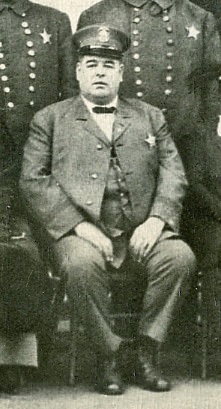 Peter Johnstone was born on March 13, 1883 in Scotland. As his obituary states, his first place of employment was on a farm near Eagle. He became a part of the police department in 1910, and in 1914 was promoted to captain of detectives.
Peter Johnstone was born on March 13, 1883 in Scotland. As his obituary states, his first place of employment was on a farm near Eagle. He became a part of the police department in 1910, and in 1914 was promoted to captain of detectives.
Even as chief of police, Johnstone was out on the streets making numerous arrests.
He was also the republican candidate for sheriff in 1922.
An article about Johnstone appeared in the Lincoln Sunday Star on September 21, 1930.
Headline: Johnstone Hits Police Criticism
Byline: Chief Urges Need for Motor Equipment; Alarm System. Says Informant Failed Give Necessary Information
Objecting to criticisms of the Lincoln police forced voiced since the hold-up of the Lincoln National Bank and Trust Co. Wednesday and calling attention to efforts he has made to secure adequate police equipment, Chief of Police Johnstone directed a letter Saturday to Commissioner of Public Safety Foster. The chief defended actions of the police on the grounds that if telephone informants had told that a bank robbery was in progress officers could have gone prepared.
 Obituary in the Lincoln Journal Star on April 28, 1958
Obituary in the Lincoln Journal Star on April 28, 1958
Headline: Ex-Police Chief Dies
Byline: Peter Johnstone Succumbs at 75
Peter Johnstone, 75, former Lincoln chief of police, died in Kansas City, Mo, Sunday.
Born in Scotland on March 13, 1883, Mr. Johnstone came to America in 1906. He was first employed on a farm near Eagle.
After working at various occupations for 4 years, he became a member of the city police department. He became captain of detectives in 1914.
Mr. Johnstone was chief of police when the $2.8 million robbery of the Lincoln National Bank and Trust Co. occurred on Sept 17, 1930.
He had been named acting chief of police in 1918 and served as chief until 1930. Following the robbery he became a guard at the First Trust Company.
Mr. Johnstone was a member of the International Assn. of Police Chiefs, director of the Boy Scout organization, member of the Chamber of Commerce and Kiwanis. He was a 32rd degree Scottish rite Mason, Shriner, and a member of the Second Presbyterian Church.
Survivors include daughters, Mrs. Fredrick Steurtz of York and Mrs. Jack Lindley of Kansas City, Mo; a son, James F. of Lincoln; 10 grandchildren and 2 great-grandchildren.
Chief from 1930 - 1933 and 1935 - 1941
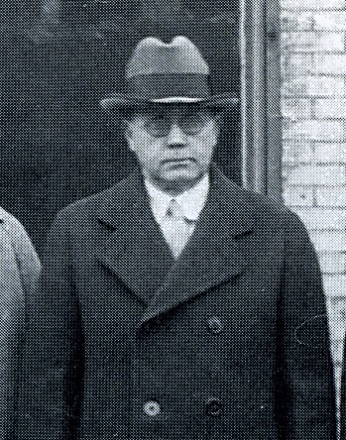 Sanford Walter Anderson was born in LaPorte, Indiana on June 24, 1869. He moved to Lincoln at the age of 21. He relocated to Los Angeles in 1912, but returned to Lincoln in 1918.
Sanford Walter Anderson was born in LaPorte, Indiana on June 24, 1869. He moved to Lincoln at the age of 21. He relocated to Los Angeles in 1912, but returned to Lincoln in 1918.
Before he was hired by the police department in 1918, Walter worked in billiards and as a bartender in a saloon. He joined the department as a detective and became captain of the detectives only six months later.
An article in The Nebraska State Journal on June 18, 1922 tells about Walter being bit by a dog during an alcohol raid.
In 1933, Walter Anderson was appointed chief of police by Major Frank Zehrung and appointed as chief again in 1935 by Mayor Charles Bryan. Anderson was known for reorganizing and modernizing the police department; however, he was discharged because he refused to resign as chief.
Walter passed away on April 8, 1957. He is buried with his wife, Myrtle, in Wyuka Cemetery in Lincoln, Nebraska.
Headline: Dog Bites Chief Detective
Byline:Walter Anderson Attacked by Bulldog When Making a Liquor Raid on North Fifteenth.
Walter Anderson, captain of Lincoln detectives, was bitten rather badly at 6 p. m. Friday by a large bulldog when he and other officers made a liquor raid on the house of Mrs. Ethel Brown, colored, 935 North Fifteenth Street. Mrs. Brown was in the yard when an automobile carrying the police drove up, and she ran into the house. Detective Anderson ran after her, caught her and attempted to hold her. At that moment the bull dog rushed in and grabbed the calf of his leg. He pulled the dog off. Later the dog-catcher took it to the pound. One gallon of whiskey was secured.
In March another raid had been attempted on the same place. The dog was tied under a porch at the time and would let no one approach him.
Dr. R. L. Bentley, who dressed Anderson's wound, states that it will not be serious if infection does not set in.
Other articles related to Chief Anderson:
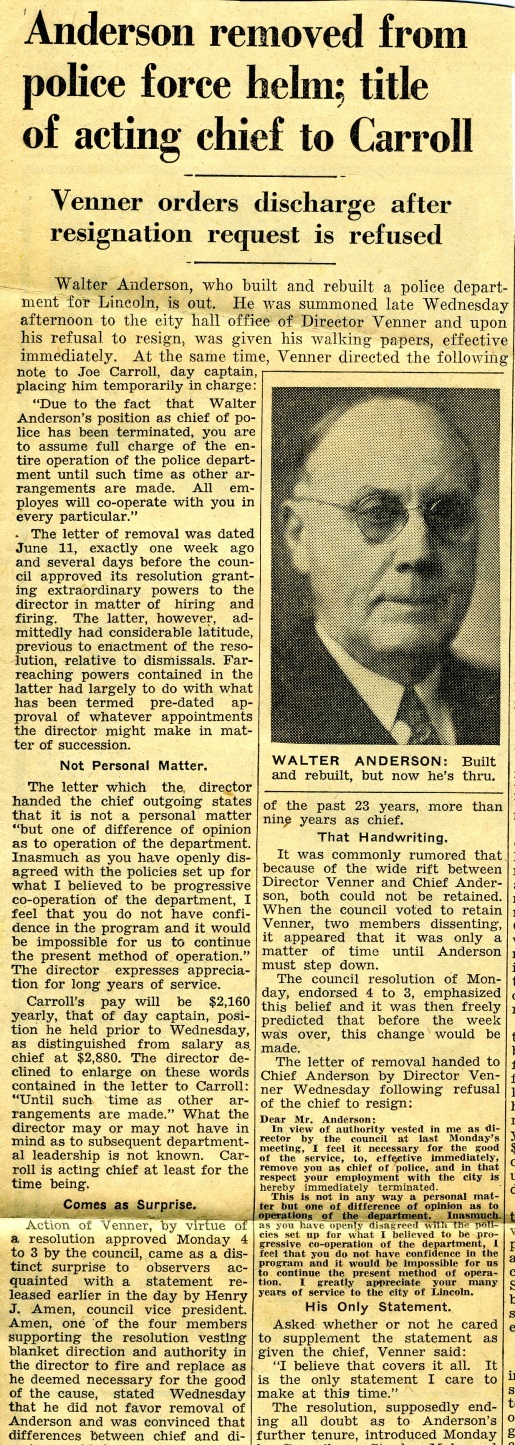

Chief from 1933 - 1935
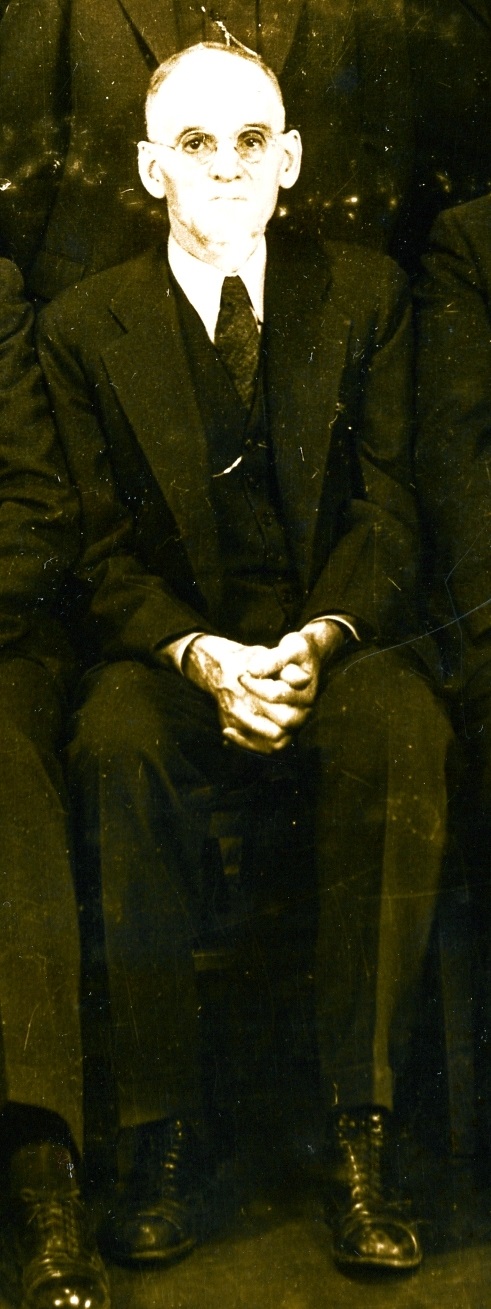 Born on May 12, 1874
Born on May 12, 1874
Died in April of 1958
William C. Condit was born in Anamosa, Iowa to William Condit and Emily Crane. He married in February of 1899 to Sylvia Jane Walker in Iowa. Together they had one son, Volcott Condit, who also joined the Lincoln police force.
An article by historian Jim McKee in the Lincoln Journal Star on January 9, 2011 summarizes Condit's work with the Lincoln Police Department as well as the Nebraska State Patrol.
Headline: William C. Condit and the early-day Nebraska State Patrol
William Crane Condit was born in Iowa in 1874. After completing high school, he farmed, first with his father and later on his own, moving to Fremont in 1898.
He worked for a marble company, owned a freighting business, became a foreman for the CB&Q Railroad and finally was appointed a Dodge County deputy sheriff in 1909.
Just over two weeks after his appointment, he was assigned to take a patient to the Insane Asylum in Lincoln. While waiting at the depot, the patient attempted suicide by jumping in front of an approaching train. Condit managed to throw the patient out of harm's way, but he lost his leg when the train ran over him.
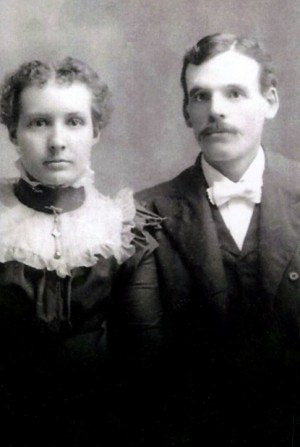 Three years later, Condit was elected sheriff of Dodge County and later was chairman of the county draft board.
Three years later, Condit was elected sheriff of Dodge County and later was chairman of the county draft board.
In 1917, the Prohibition Enforcement Act granted the governor power to enforce prohibition legislation in addition to working with automobile theft cases. Two years later, Gov. Sam McKelvie's inaugural address recommended forming a separate State Police Department for such cases, but it was not until 1927 that the office of state sheriff was created by the Legislature to assist the governor in enforcing criminal laws.
At the same time, branch banking was forbidden in Nebraska and the highway speed limit was raised from 20 to 35 mph, Gov. Adam McMullen appointed Condit to the post of state sheriff at an annual salary of $4,000, a position he would hold until 1931.
During his tenure, Condit was involved in investigating Lincoln's 1930 Great Bank Robbery at the Lincoln State National Bank on the northwest corner of 12th and O streets and, for the first time, drivers licenses were issued at 75 cents each.
In 1931, Condit became a member of the Lincoln Police Department, and when Mayor Fenton Fleming fired Police Chief Walt Anderson, Condit took over as chief. One of his major accomplishments was the installation of radio receivers in patrol cars, albeit they were only receivers, not equipped for two-way communication. When Anderson was rehired in 1935, Condit retired; Anderson was fired yet again in 1941.
Meanwhile, traffic control duties had been added to the state sheriff's duties in 1933. Then in 1937 the Legislature created the Highway Safety and Patrol Division, usually referred to simply as the Nebraska Safety Patrol, as part of the Department of Roads and Irrigation. The chief officer of the patrol was the state sheriff.
Thirty-five hundred applicants vied for what finally resulted in 54 men being selected for the five-week training course. Applicants were required to be 25 to 45 years old, at least 5-foot-10, have a high school diploma, be "physically normal (and have) sound family and moral backgrounds." Condit was one of the training officials for this first class.
In 1941, the title state sheriff was changed to "superintendent of law enforcement and public safety" with the rank of colonel. Meanwhile, highway speed limits were raised to 60 mph and the 125 uniformed officers' duties expanded while the patrol's internal Bureau of Criminal Apprehension began keeping files of fingerprints, criminal histories and photos.
In 1967, the official name became the Nebraska State Patrol, which became a separate state agency in 1981.
Condit died in 1958, about the time the words state sheriff finally disappeared from the Nebraska Legislative Blue Book listing.
Condit, the sheriff's sheriff, was the first person in Nebraska to use fingerprints to bring a killer to justice, one of the first to use the lie detector and in many ways was the father of the Nebraska State Patrol.
Chief from 1930 - 1933 and 1935 - 1941
 Sanford Walter Anderson was born in LaPorte, Indiana on June 24, 1869. He moved to Lincoln at the age of 21. He relocated to Los Angeles in 1912, but returned to Lincoln in 1918.
Sanford Walter Anderson was born in LaPorte, Indiana on June 24, 1869. He moved to Lincoln at the age of 21. He relocated to Los Angeles in 1912, but returned to Lincoln in 1918.
Before he was hired by the police department in 1918, Walter worked in billiards and as a bartender in a saloon. He joined the department as a detective and became captain of the detectives only six months later.
An article in The Nebraska State Journal on June 18, 1922 tells about Walter being bit by a dog during an alcohol raid.
In 1933, Walter Anderson was appointed chief of police by Major Frank Zehrung and appointed as chief again in 1935 by Mayor Charles Bryan. Anderson was known for reorganizing and modernizing the police department; however, he was discharged because he refused to resign as chief.
Walter passed away on April 8, 1957. He is buried with his wife, Myrtle, in Wyuka Cemetery in Lincoln, Nebraska.
Headline: Dog Bites Chief Detective
Byline:Walter Anderson Attacked by Bulldog When Making a Liquor Raid on North Fifteenth.
Walter Anderson, captain of Lincoln detectives, was bitten rather badly at 6 p. m. Friday by a large bulldog when he and other officers made a liquor raid on the house of Mrs. Ethel Brown, colored, 935 North Fifteenth Street. Mrs. Brown was in the yard when an automobile carrying the police drove up, and she ran into the house. Detective Anderson ran after her, caught her and attempted to hold her. At that moment the bull dog rushed in and grabbed the calf of his leg. He pulled the dog off. Later the dog-catcher took it to the pound. One gallon of whiskey was secured.
In March another raid had been attempted on the same place. The dog was tied under a porch at the time and would let no one approach him.
Dr. R. L. Bentley, who dressed Anderson's wound, states that it will not be serious if infection does not set in.
Other articles related to Chief Anderson:


Chief from 1941 - 1975
 Joseph Carroll was born on March 2, 1910, in Alma, Nebraska to Thomas and May Carroll. Joe Carroll was raised in a law enforcement family; his father Thomas Carroll served as a U.S. Marshall and a State Sheriff. Joe Carroll had two brothers, Thomas and Patrick, and four sisters, Helena, Mary, Genevieve, and Irene.
Joseph Carroll was born on March 2, 1910, in Alma, Nebraska to Thomas and May Carroll. Joe Carroll was raised in a law enforcement family; his father Thomas Carroll served as a U.S. Marshall and a State Sheriff. Joe Carroll had two brothers, Thomas and Patrick, and four sisters, Helena, Mary, Genevieve, and Irene.
Carroll graduated from Cathedral High School in Lincoln and attended the University of Nebraska with the ambition to become a lawyer. After three years, however, Carroll decided to join the Lincoln Police force. He began working for the department on November 1, 1930 as a night jailor. Carroll soon transitioned to beat walker and was promoted to detective in 1932. He married Marjorie on November 4, 1933 and they later had one son, Joseph Jr.
Carroll graduated from the FBI academy in 1938 and was promoted to captain the following year. In 1939, he became the night captain of detectives. In 1941, Carroll assumed his new role as chief of police at the age of 31.
Throughout his career as chief, Carroll oversaw many infamous cases such as that of Charles Starkweather and Charles Mulholland and the $10,000 bank robbery. While serving as chief, Carroll received many awards including the J. Edgar Hoover "Gold Medal Award", the University of Nebraska Alumni Achievement Award, the Distinguished Citizen Award of the Lincoln Exchange Club, and the Gateway Sertoma Club "Service to Mankind" Award. Carroll retired from the Lincoln Police Department on March 1st, 1975 ending a 44-year long career. After retiring, Carroll served as a consultant for the State DMV Highway Safety Program and later the State Department of Labor's Safety Division. Joseph T. Carroll passed away from an apparent heart attack on December 11, 1990 at the age of 80.
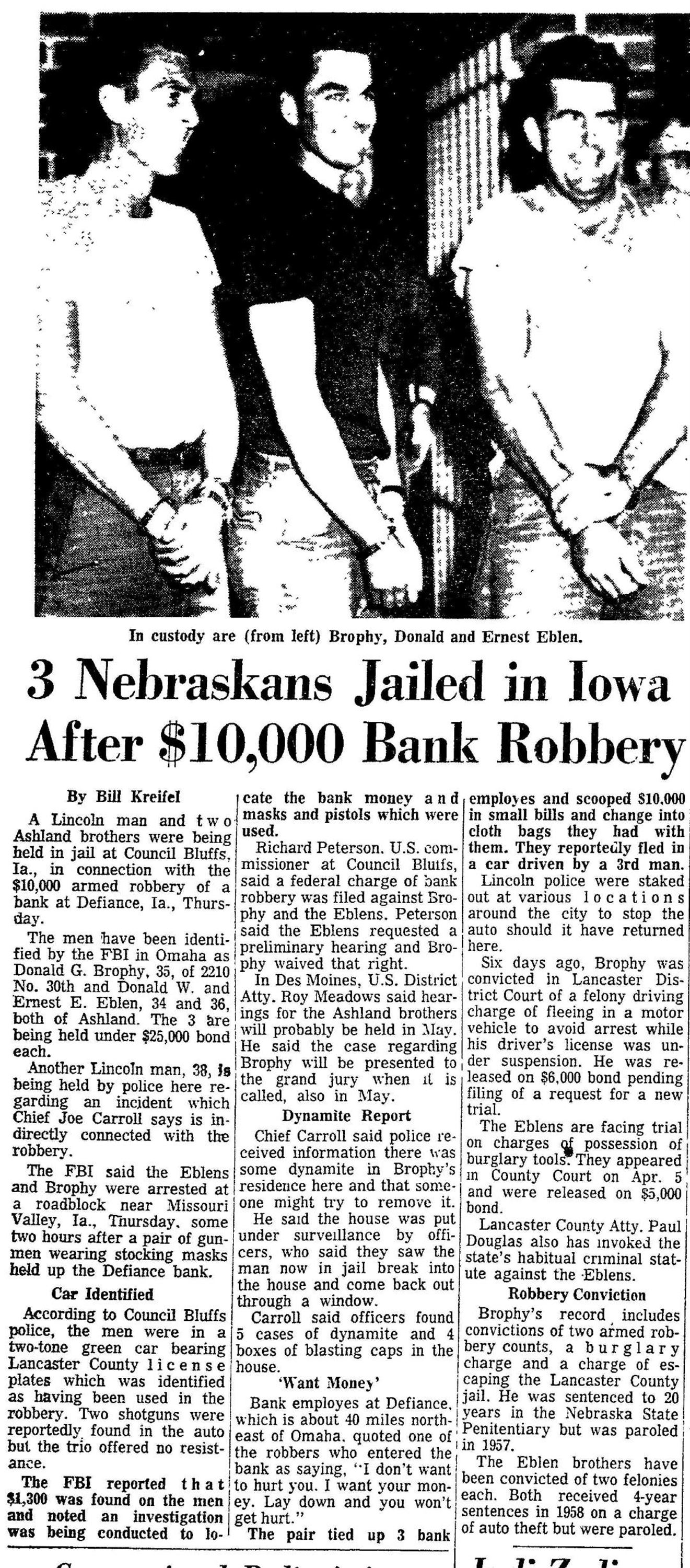
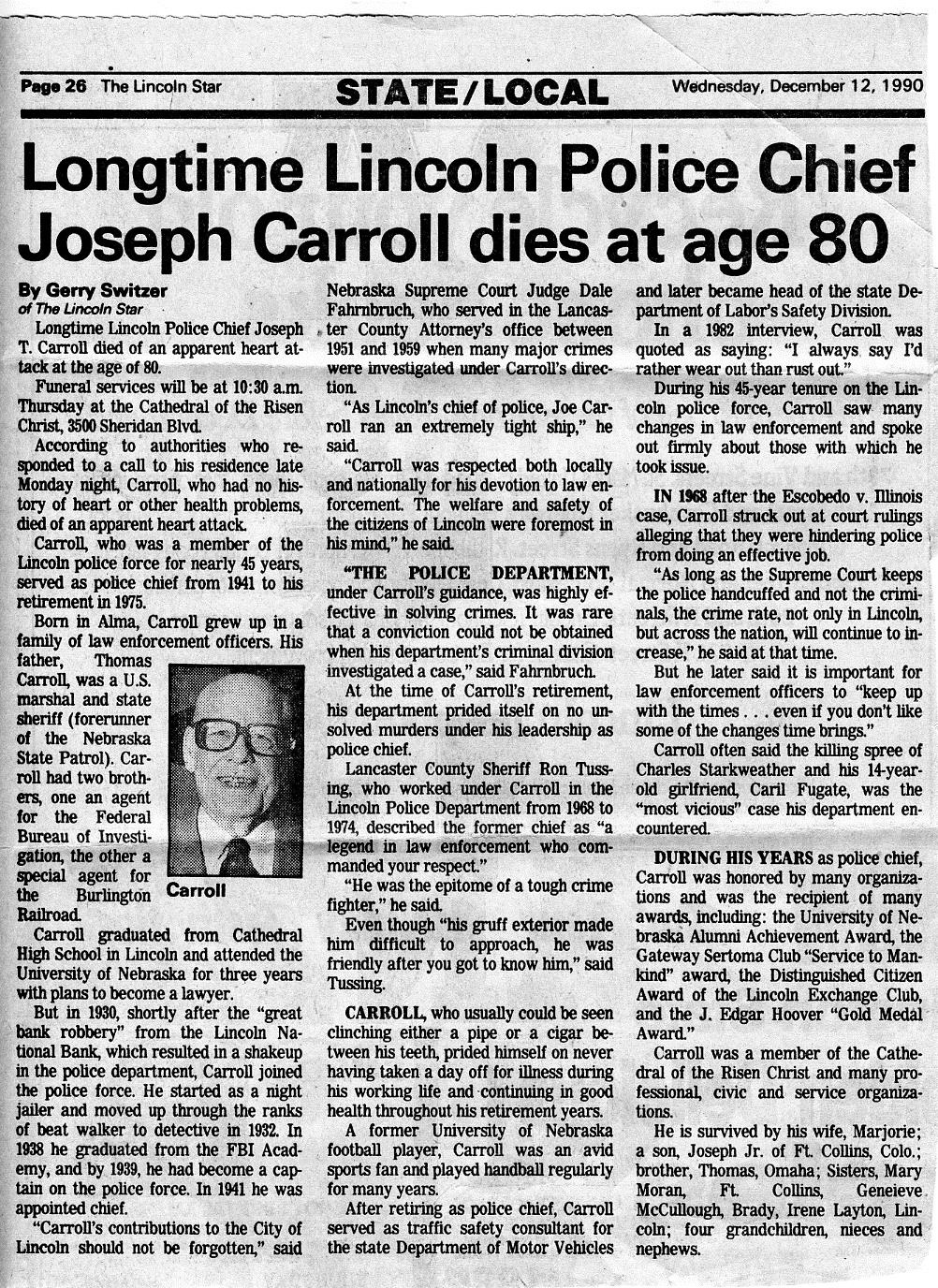
Chief from 1975 - 1978
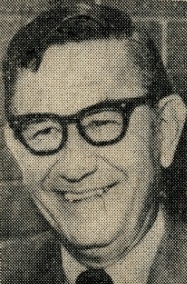 George Hansen was born on May 3, 1921 in Falls City, Nebraska. Hansen met his wife, Donna, while the two were attending the University of Nebraska- Lincoln. He served in the U.S. Army for twenty- eight years before becoming chief of police. Though he was only the chief for three years, Hansen is remembered for his modern policing approaches and making lasting changes within the department. He was the first chief to hire women as commissioned officers. He introduced team policing, changed the uniforms, the badge, the shoulder patches, and the color of police cruisers.
George Hansen was born on May 3, 1921 in Falls City, Nebraska. Hansen met his wife, Donna, while the two were attending the University of Nebraska- Lincoln. He served in the U.S. Army for twenty- eight years before becoming chief of police. Though he was only the chief for three years, Hansen is remembered for his modern policing approaches and making lasting changes within the department. He was the first chief to hire women as commissioned officers. He introduced team policing, changed the uniforms, the badge, the shoulder patches, and the color of police cruisers.
The Lincoln Police Department was grateful for the transformations George Hansen made as chief. It is believed that he improved the department as a whole and increased the department's professionalism. After resigning as chief and taking a position in Fresno, California, Assistant Chief Dean Leitner as was appointed as police chief.
The Sun - unknown date, 1975
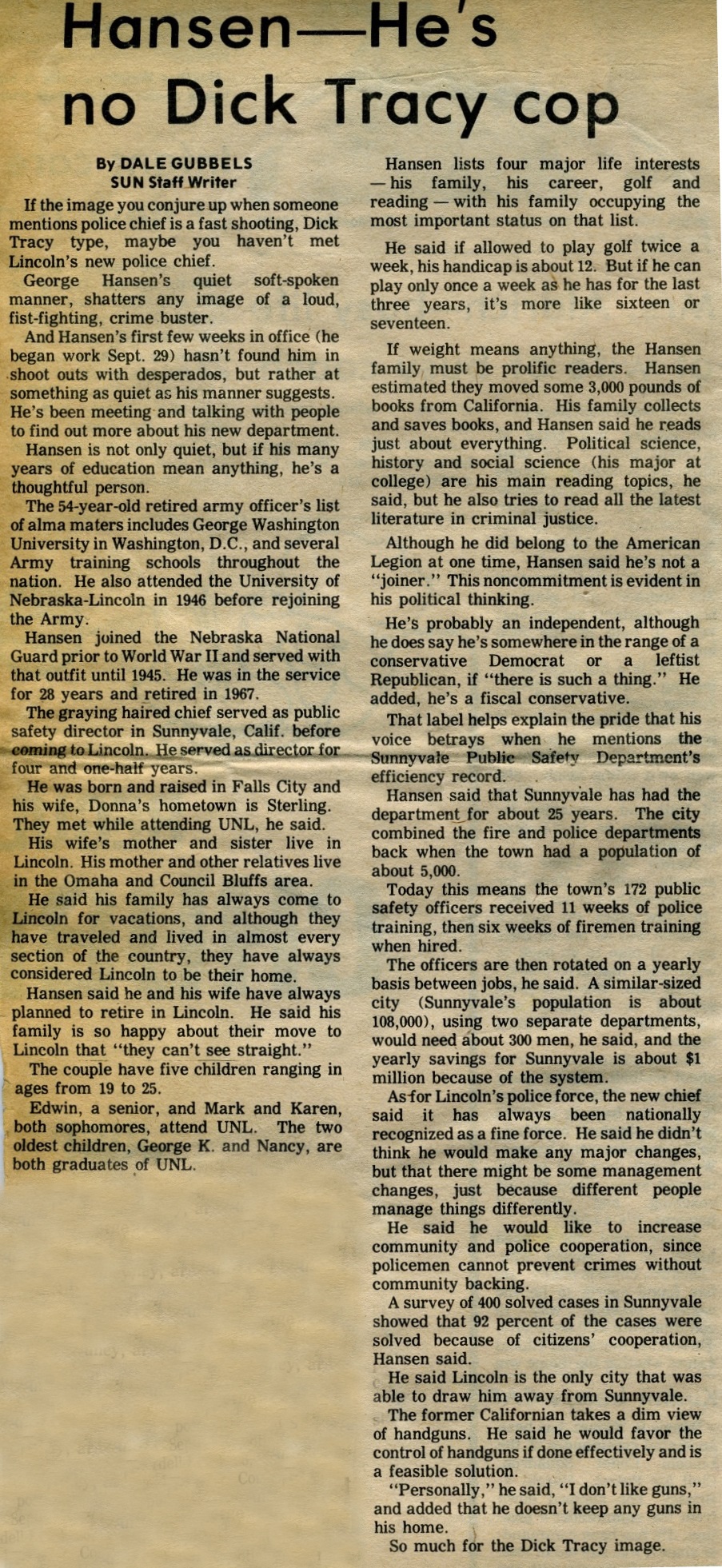 Headline: Hansen - He's no Dick Tracy cop
Headline: Hansen - He's no Dick Tracy cop
George Hansen's first few weeks in office (he began work Sept. 29) hasn't found him in shoot outs with desperados, but rather at something as quiet as his manner suggests. He's been meeting and talking with people to find out more about his new department.
Hansen is not only quiet, but if his many years of education mean anything, he's a thoughtful person. The 54-year-old retired army officer's list of alma maters included George Washington University in Washington, D.C., and several Army training schools throughout the nation. He also attended the University of Nebraska-Lincoln in 1946 before rejoining the Army.
Hansen joined the Nebraska National Guard prior to World War II and served with that outfit until 1945. He was in the service for 28 years and retired in 1967.
The graying haired chief served as public safety director in Sunnyvale, Calif. before coming to Lincoln. He served as director for four and one-half years.
He was born and raised in Falls City and his wife, Donna's hometown in Sterling. They met while attending UNL, he said.
His wife's mother and sister live in Lincoln. His mother and other relatives live in the Omaha and Council Bluffs area.
He said his family has always come to Lincoln for vacations, and although they have traveled and lived in almost every section of the country, they have always considered Lincoln to be their home.
Hansen said he and his wife have always planned to retire to Lincoln. He said his family is so happy about their move to Lincoln that "they can't see straight."
The couple have five children ranging in ages from 10 to 25.
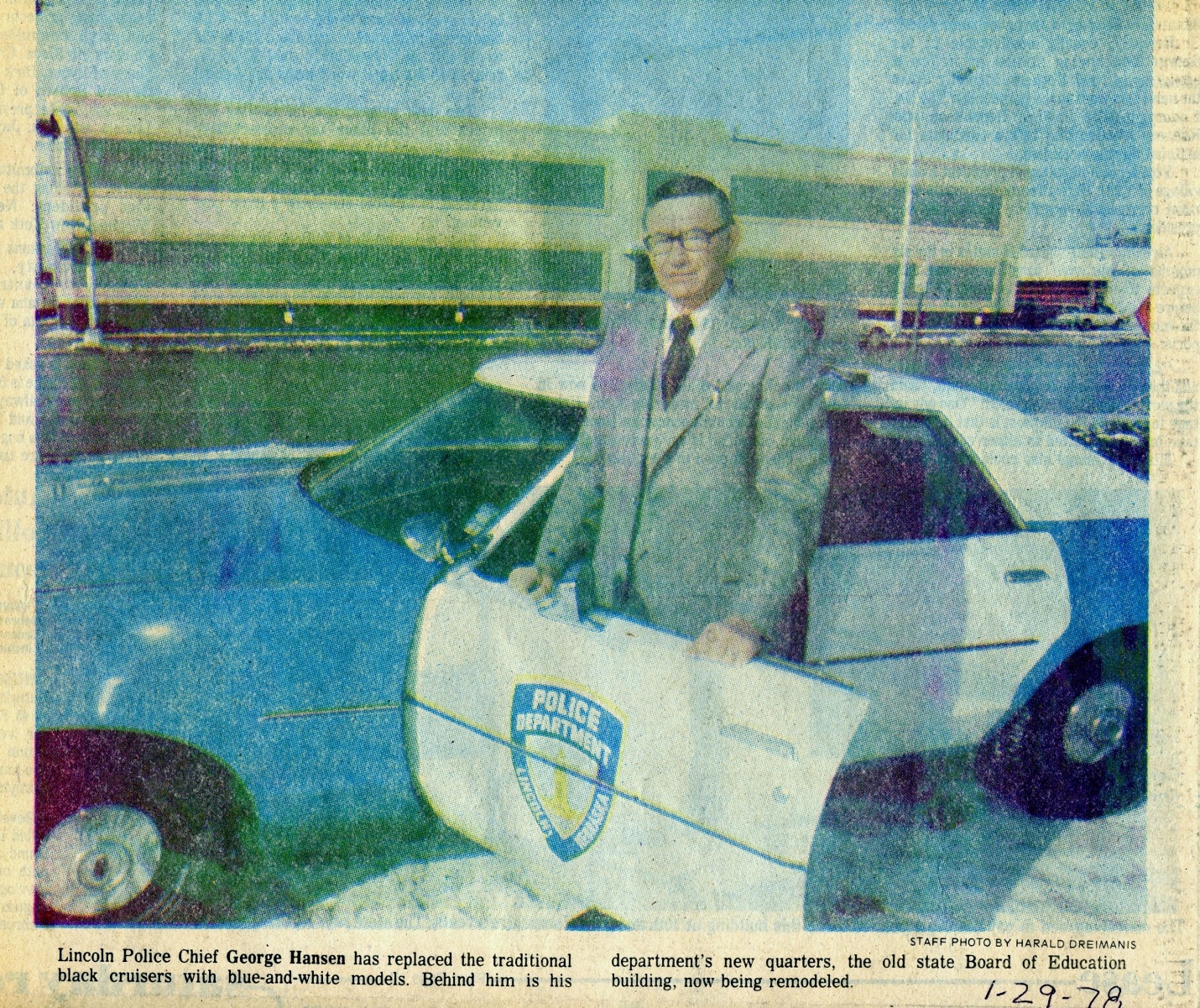
Chief from 1979 - 1988
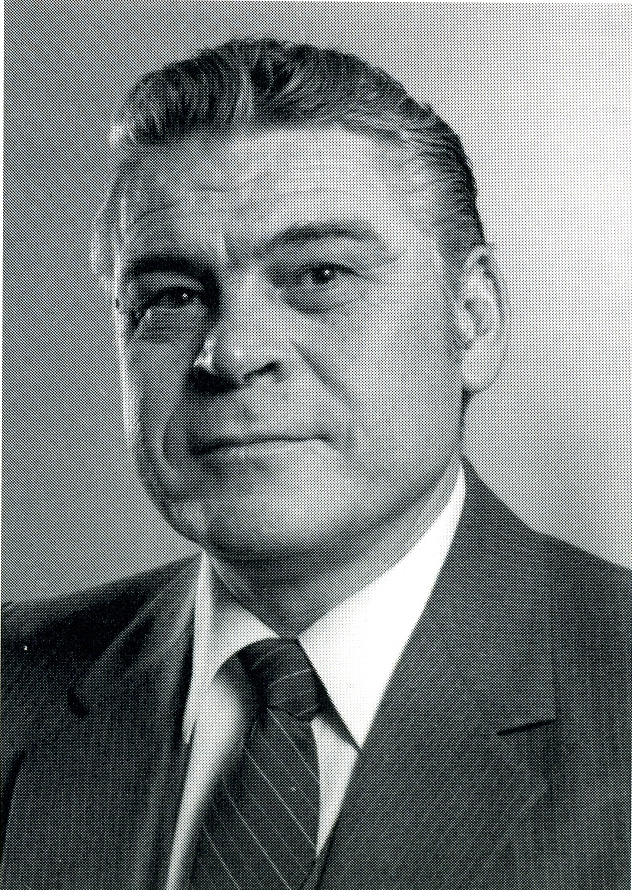 Beverly Dean Leitner was born June 7, 1933, on a ranch in Kansas. He was married to Rose and together they had two children, Greg and Debbie.
Beverly Dean Leitner was born June 7, 1933, on a ranch in Kansas. He was married to Rose and together they had two children, Greg and Debbie.
After completing a tour in Japan with the U.S. Army from 1952 to 1953, the couple moved to Lincoln. He joined the Lincoln Police Department in 1956. Dean received a bachelor's degree from the University of Nebraska-Lincoln in 1974.
He was a motorcycle officer in the late 1950's but was involved in a bad accident in 1959 in which he suffered a broken leg. He came back to work soon after and, as a lieutenant, he was the third person from the Lincoln Police Department to be accepted to take part in a nine-month traffic program. He served as assistant chief to George Hansen, who moved to become chief in Fresno, California in January 1979. Soon after, Leitner became chief of police. However, Leo Scherer, a city councilman, accused Mayor Boosalis of rushing to appoint Leitner as chief. An article (right) from December 20, 1978 describes Scherer's frustration.
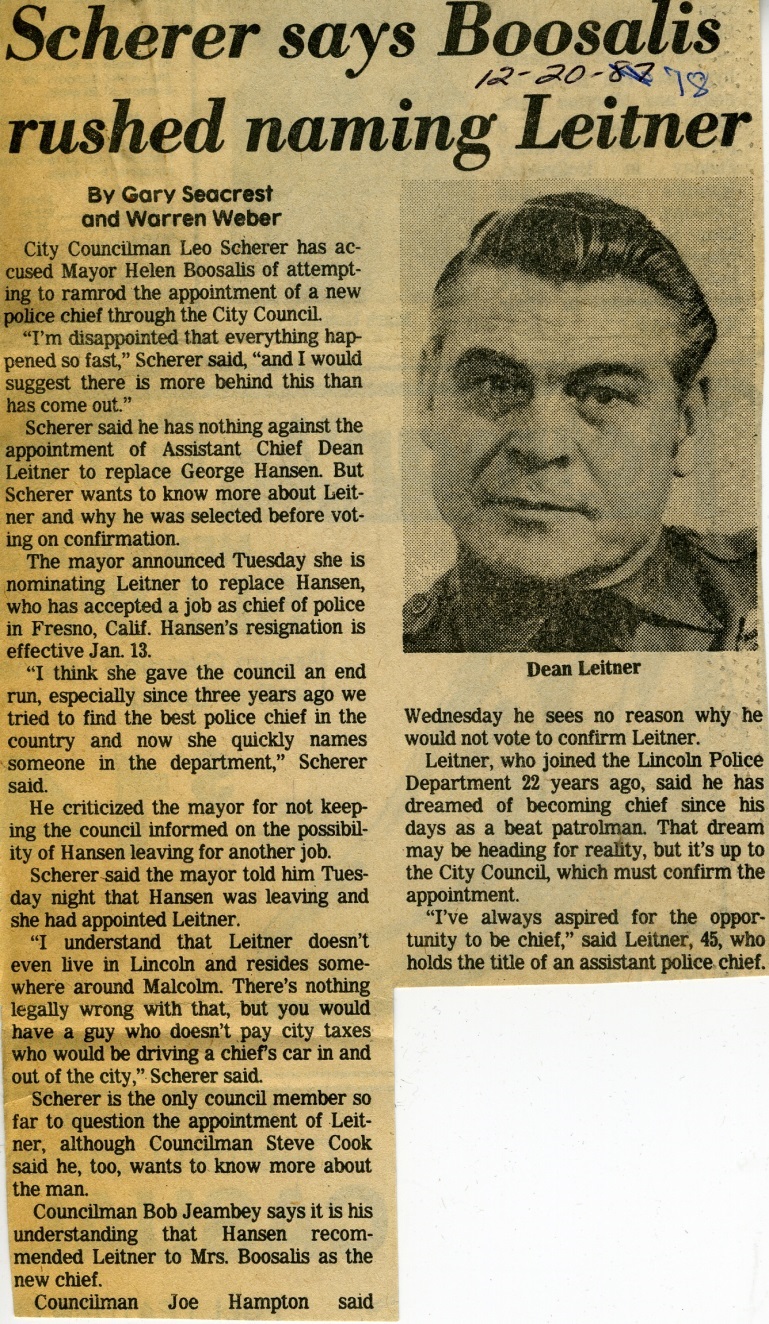 In January of 1974, he extended the Lincoln's Fatality Accident Reduction Enforcement program (FARE). This program was put in place to help pedestrians cross the street safely. "The program was geared to hazardous moving violations during its 1973 operation in Lincoln, and not toward pedestrians." (John Gleason, Lincoln Journal Star, Jan. 20,1974, pg 8B) The program was enforced around schools during early morning hours, and other locations they determined were areas of concern.
In January of 1974, he extended the Lincoln's Fatality Accident Reduction Enforcement program (FARE). This program was put in place to help pedestrians cross the street safely. "The program was geared to hazardous moving violations during its 1973 operation in Lincoln, and not toward pedestrians." (John Gleason, Lincoln Journal Star, Jan. 20,1974, pg 8B) The program was enforced around schools during early morning hours, and other locations they determined were areas of concern.
In the 1988 Annual Report, Lincoln Police Department had a special dedication to Chief Leitner, stated as follows:
The officers and employees of the Lincoln Police Department would like to dedicate the 1988 Annual Report to B. Dean Leitner, who after 10 years as chief, retired this year. Through his dedication and insight the Lincoln Police Department is a leader in law enforcement excellence.
Appointed as a Police Officer in January 1957, Chief Leitner served in virtually every capacity within the department. In 1974, then Mayor Helen Boosalis, appointed him Chief of Police.
During his 31 year tenure, Chief Leitner saw numerous changes within the department. For example, in the mid-70's the changes to Community Policing, increased need for formal education, and rising community demands. Chief Leitner was always responsive to department and community needs, and possessed an uncanny ability to predict future needs and concerns. An employee or citizen with a problem or concern never found his door closed.
It is because of Chief Leitner that Lincoln is viewed by many as a very profession, community-conscious department that in many ways is a nation model and reservoir of talked for other departments. We take pride in outstanding and strive to continually build on our strong foundation.
Upon retiring, Chief Leitner indicated a desire to spend more time with wife Ro on their boat. We would also like to thank Ro for her understanding through the year of long hours, interrupted dinners and missed outings. Ro exemplifies the family support need in law enforcement, for her dedication to the department was as great as his.
We hope retirement brings happiness, good health and good fishing to them, wherever they may go.
- Lincoln Police Department
Dean Leitner retired from the Lincoln Police Department in April of 1988 and moved to Hemet, California in 1989, where he lived only 30 minutes from his son Greg. Leitner passed away at the age of 70 on December 13, 2003. He is buried, along with his wife Rose, in the Zion Lutheran Cemetery in Lincoln, Nebraska.
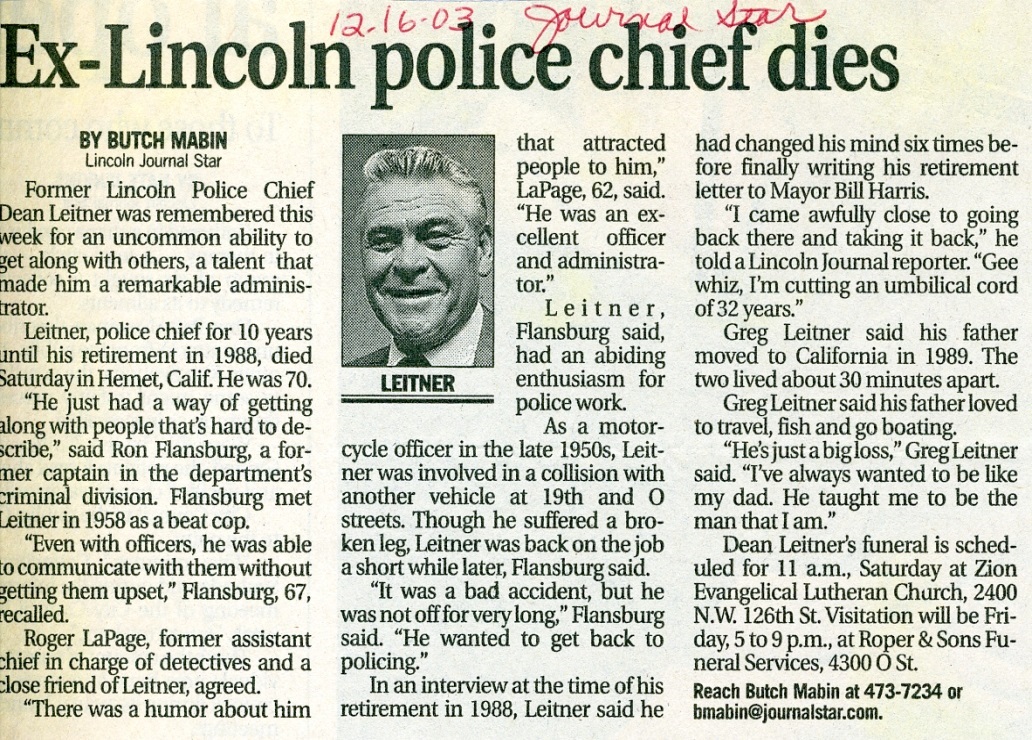
Chief from 1988 - 1993
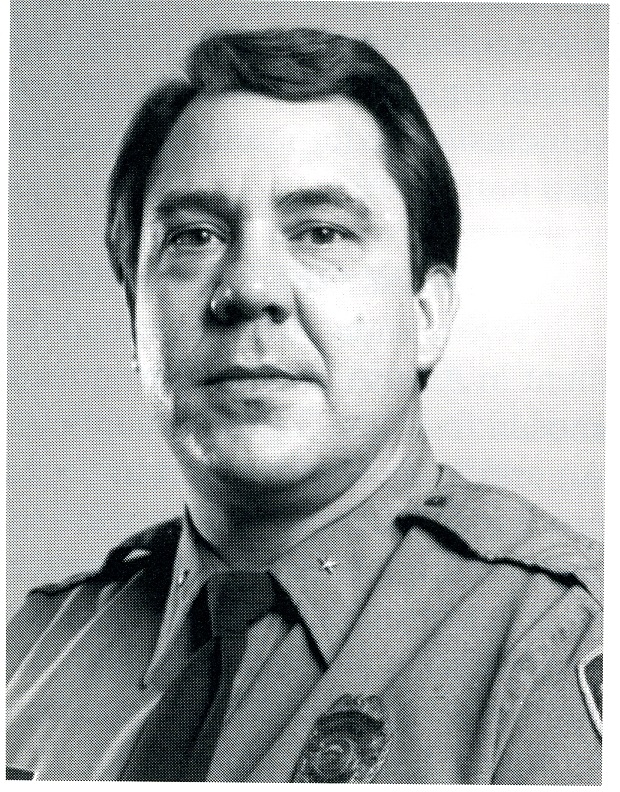 Allen Curtis became Police Chief of the Lincoln Police Department on August 4th, 1988. He replaced Police Chief B. Dean Leitner. At his retirement party, Chief Leitner looked at Allen and said jokingly "the Lincoln Police Force is staffed by so many qualified individuals that a monkey could head the department." Chief Curtis was given a gift of a glass statue of a monkey wearing a police hat and sitting in a tree chattering at three subordinates to start out his tenure. The gift sat on his desk throughout his time as Chief.
Allen Curtis became Police Chief of the Lincoln Police Department on August 4th, 1988. He replaced Police Chief B. Dean Leitner. At his retirement party, Chief Leitner looked at Allen and said jokingly "the Lincoln Police Force is staffed by so many qualified individuals that a monkey could head the department." Chief Curtis was given a gift of a glass statue of a monkey wearing a police hat and sitting in a tree chattering at three subordinates to start out his tenure. The gift sat on his desk throughout his time as Chief.
As chief, Curtis was involved in the Nebraska Crime Victims Reparation Program, the Victims of Crime Act Program, and the Stop Violence against Women ACT program. One of the first things Chief Curtis said after he was appointed was that he intended to give the captains and sergeants in the department more responsibility in making decisions concerning law enforcement in Nebraska. He believed that if he gave them more control they would take more pride in what they do and become more highly motivated.
Curtis was the chief during the infamous Steven Jacob homicide case. In 2003, he was inducted into the Police Officers Association Hall of Fame; at that time he was the director of the Nebraska Crime Commission. Another notable occurrence during Chief Curtis' term as chief was the promotion of the first ever female lieutenant for the Lincoln Police Department, Joy Citta.
One of Chief Curtis' main prerogatives was to eradicate the dealing and using of drugs in the city of Lincoln. He used an aggressive approach to this task and also the task of minimizing gang-related crime. He encouraged a crackdown on street level users and dealers and did very well on this during the years of his service as chief. Notably, Chief Curtis was pictured shaking hands with former President Bush during Bush's stop in Lincoln, where LPD assisted in providing security.
He became director of the Nebraska Crime Commission in 1994 and served there for 11 years until he retired on Friday, January 28, 2005.
Chief from 1994 - 2011
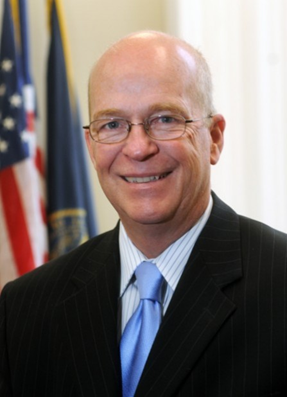 Chief Tom Casady has had a distinguished law enforcement career, and has contributed to law enforcement internationally, nationally, within Nebraska and his hometown of Lincoln. He received his bachelor's degree in Criminology and Criminal Justice from the University of Nebraska-Omaha and a Masters of Arts degree in Political Science from the University of Nebraska-Lincoln.
Chief Tom Casady has had a distinguished law enforcement career, and has contributed to law enforcement internationally, nationally, within Nebraska and his hometown of Lincoln. He received his bachelor's degree in Criminology and Criminal Justice from the University of Nebraska-Omaha and a Masters of Arts degree in Political Science from the University of Nebraska-Lincoln.
His law enforcement career began in 1974 with the Lincoln Police Department. He achieved the rank of lieutenant in 1986, just before leaving in 1987 to serve as the Chief Deputy of the Lancaster County Sheriff's Office. In 1991, he became the Lancaster County Sheriff replacing Sheriff Ron Tussing and was subsequently appointed by Mayor Mike Johanns as Chief of Police for Lincoln in 1994. He is well known for his technology savvy and willingness to share his ideas and projects with other agencies.
During his tenure, Chief Casady was instrumental in reshaping the way the Lincoln Police Department investigates domestic violence, domestic abuse and neglect cases. Protecting the victims is a top priority for him. The department offers a Victim/Witness Unit and full-time investigator assigned as a Domestic Violence Coordinator. Chief Casady was also among several local officials that chaired a campaign committed to the development of a child advocacy center in the community. By assisting the victims and arming them with knowledge, he sees that future incidents can be prevented.
Chief Casady was active in reducing binge alcohol drinking and was a strong supporter of Mothers Against Drunk Driving. He served as the co-chair with the Vice Chancellor at University of Nebraska- Lincoln on a Community Coalition working to reduce binge drinking. Under Chief Casady's leadership, the City of Lincoln witnessed a 22% reduction in Part 1 crimes while; at the same time, Lincoln's population increased 26%. From 2000 to 2009, the City of Lincoln experienced a 68% increase in DUI arrests. Attention to this issue led to a 3% reduction in total traffic accidents and a 21% reduction in injury accidents. Assaults with a weapon dropped 7.5% and assaults without weapons were down 19% over the same period.
In 2011, Chief Casady was appointed Public Safety Director by Mayor Beutler. He was given responsibility for three city agencies with over 760 employees who provide police, fire, emergency medical services, and public safety communications for Lincoln's municipality of 265,000 citizens. Casady retired as Public Safety Director in March 2019.
Chief from 2011 - 2016
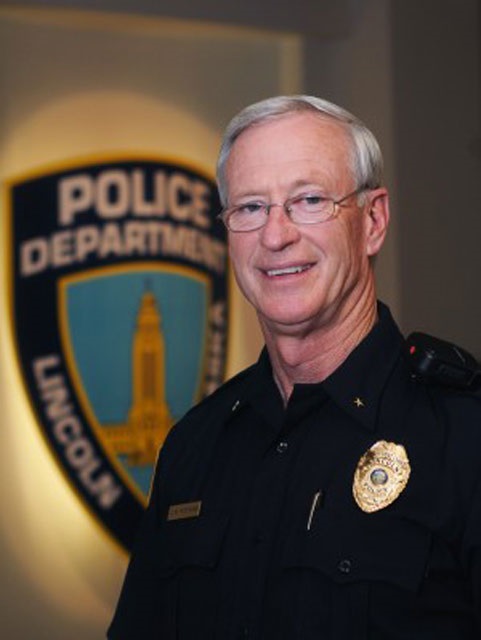 Chief Jim Peschong was hired with the Lincoln Police Department in January 1975 after serving in the U.S. Army. He worked as a cruiser officer, a motor officer, a detective, and served as a lieutenant and a captain in the Criminal Investigations Unit. He was also a team captain on the Southwest and the Northwest/Center Teams before his promotion to assistant chief under Chief Tom Casady.
Chief Jim Peschong was hired with the Lincoln Police Department in January 1975 after serving in the U.S. Army. He worked as a cruiser officer, a motor officer, a detective, and served as a lieutenant and a captain in the Criminal Investigations Unit. He was also a team captain on the Southwest and the Northwest/Center Teams before his promotion to assistant chief under Chief Tom Casady.
Peschong was very active both inside and outside of the police department. He represented the Norris School Board beginning in 1990 and was board president from 1993-1995. He served on the Norris Educational Foundation Board, AFIS Advisory Board, and Project Safe Neighborhoods State Board of Directors, People's Choice Credit Union Board of Directors and several community boards and committees. He is a graduate of the FBI National Academy #196 and Central States L.E.E.D.S., a member of the International Association of Chiefs of Police and served as President on the Police Officer's Association of Nebraska Board of Directors. Chief Peschong was also a member of Police Chief's Association of Nebraska (PCAN).
Under Chief Peschong, the Lincoln Police Department reinstated several teams of two officer cruisers, a practice left behind in the mid 1970's. Peschong noted that the change was a result of new technologies, officer safety and higher gas prices. Peschong also focused on reducing teen drinking, and combatting gangs and violent crimes in our community. Overall, there was a steady decrease in violent crime numbers as Peschong strived to make Lincoln a safer city.
Chief Peschong continued to move the Lincoln Police Department forward in the area of technology - adding in-car cameras, digital crime scene evidence collection, a high-tech mobile command post, and digital training systems.
Chief from 2016 - 2021
 In April 2016, Jeffrey Bliemeister was selected as Lincoln's Chief of Police. "Jeff rose to the top of a very competitive field of six finalists, who were all highly-regarded and well-qualified candidates," Mayor Beutler said. "He shares my vision of maintaining our Police Department's reputation as an exemplary agency with strong connections to the community. The men and women of LPD provide excellent services in an efficient manner, and Jeff has the experience to build on those strengths."
In April 2016, Jeffrey Bliemeister was selected as Lincoln's Chief of Police. "Jeff rose to the top of a very competitive field of six finalists, who were all highly-regarded and well-qualified candidates," Mayor Beutler said. "He shares my vision of maintaining our Police Department's reputation as an exemplary agency with strong connections to the community. The men and women of LPD provide excellent services in an efficient manner, and Jeff has the experience to build on those strengths."
Jeff Bliemeister began his career in 1996 with the Lancaster County Sheriff's Office (LSO) holding positions of deputy, sergeant and chief deputy under Sheriff Terry Wagner. During his time with LSO, he was involved with the patrol division, field training of officers/supervisors, division sergeant, tactical response unit, criminal investigations, narcotics, special services and training and personnel. Jeff also earned a Bachelor's degree in Biology from Nebraska Wesleyan and a Master's degree in Management from Doane College.
During 2020, Chief Bliemeister served as part of the multi-department Incident Command handling the city’s response to the COVID-19 pandemic. He provided essential support for LPD after the death of Investigator Mario Herrera, the first on-duty death of a Lincoln Police Officer in over 50 years. Mayor Gaylor Baird also praised Chief Bliemeister for his community engagement efforts following protests in late spring. “His leadership benefitted the strong community partnerships that are part of the fabric of the Lincoln Police Department,” Mayor Gaylor Baird said. “Chief Bliemeister increased efforts to strengthen relationships with our community by improving transparency in police practices, connecting with our communities of color, and embracing accountability measures. We will miss his contributions to our city team, but I know his dedication to keeping our community safe will continue in his new role.” He resigned from LPD in January 2021 to begin a new career with Bryan Health.
Chief from 2021 - 2023
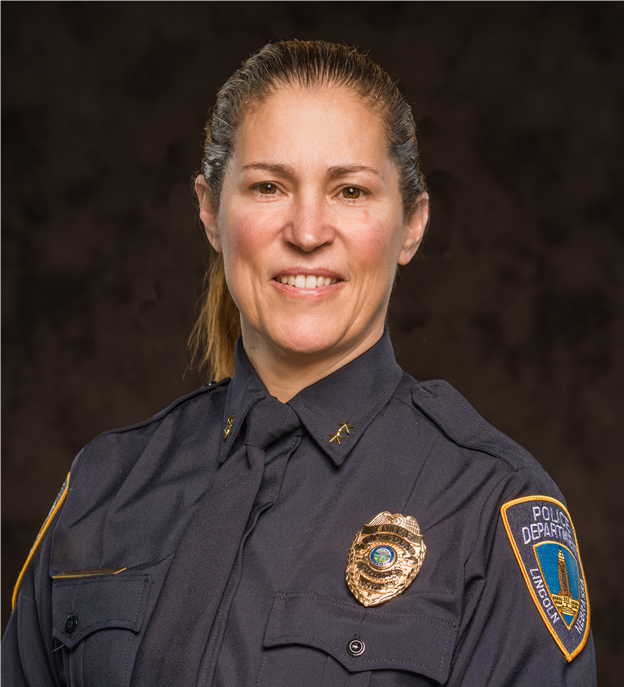 In August 2021, Teresa Ewins stepped into her role as Lincoln's chief of police. “Teresa most vividly demonstrated a commitment to the broad themes we identified during our search process as priorities for the next police chief: a commitment to community policing, support for our officers and the department, a focus on diversity and equity both within the force and in the community, and an unwavering dedication to transparency and accountability,” Mayor Gaylor Baird said. “She rose to the top of an excellent field of four finalists, all of whom were highly-regarded and well-qualified candidates.”
In August 2021, Teresa Ewins stepped into her role as Lincoln's chief of police. “Teresa most vividly demonstrated a commitment to the broad themes we identified during our search process as priorities for the next police chief: a commitment to community policing, support for our officers and the department, a focus on diversity and equity both within the force and in the community, and an unwavering dedication to transparency and accountability,” Mayor Gaylor Baird said. “She rose to the top of an excellent field of four finalists, all of whom were highly-regarded and well-qualified candidates.”
Chief Ewins was born in Santa Monica, California and has spent the majority of her life in northern California in the Bay Area. Prior to coming to Lincoln, Teresa Ewins spent 26 years with the San Francisco Police Department (SFPD). Over the course of her career at SFPD, she served in the Field Operations Bureau, Investigations Bureau and Special Operations Bureau (Homeland Security and Tactical Company). As the Commander of Field Operations Bureau-Metro Division, Ewins oversaw five of the 10 District Stations in the downtown area with approximately 900 sworn members. Ewins gained an added layer of experience in operationalizing 21st century and community-focused policing principles as she led SFPD’s work to develop policy to minimize bias in policing with the Department of Justice Collaborative Reform Initiative.
Chief from 2024 - present
 Following the departure of Chief Ewins, Michon Morrow led the Lincoln Police Department for seven months as the acting chief. In February 2024, Mayor Leirion Gaylor Baird announced the nomination of Michon Morrow as Lincoln’s permanent chief of police. “She is compassionate, collaborative, resolute, strong, and skilled at building relationships that are at the heart of a thriving police department and community,” said Mayor Gaylor Baird.
Following the departure of Chief Ewins, Michon Morrow led the Lincoln Police Department for seven months as the acting chief. In February 2024, Mayor Leirion Gaylor Baird announced the nomination of Michon Morrow as Lincoln’s permanent chief of police. “She is compassionate, collaborative, resolute, strong, and skilled at building relationships that are at the heart of a thriving police department and community,” said Mayor Gaylor Baird.
Chief Michon Morrow has been a member of the Lincoln Police Department since 1995. She started her career in the Victim Assistance Unit as a a Domestic Violence Advocate before becoming a commissioned officer in December 1997. During her tenure, she has served as Field Training Officer, Domestic Violence Investigator, Duty Commander, and Captain of the Southwest Team, one of the Department’s diverse community-based policing teams. As an Assistant Chief, she led the Management Services Unit, to include CALEA, Liquor and Keno, Legislation, and Special Projects. She also led the Emergency Communication Center, Education and Personnel, Internal Affairs, Records, Property and Evidence and Finance. She is passionate about leadership, officer wellness and service to the community. She chaired the Lincoln Police Department Wellness Committee, which she worked to establish in 2012, until 2022. She is the coordinator and a facilitator for the IACP Leadership in Police Organizations Program for 16 agencies in Eastern Nebraska as well as a National Instructor for the First Line Leadership Program. She is also an Instructor, Content Creator and Podcast moderator for VALOR. She serves on several boards for non-profit organizations and volunteers in her community on a regular basis. She holds a Master's Degree in Forensic Science, Behavioral Studies, from Nebraska Wesleyan University.